Project
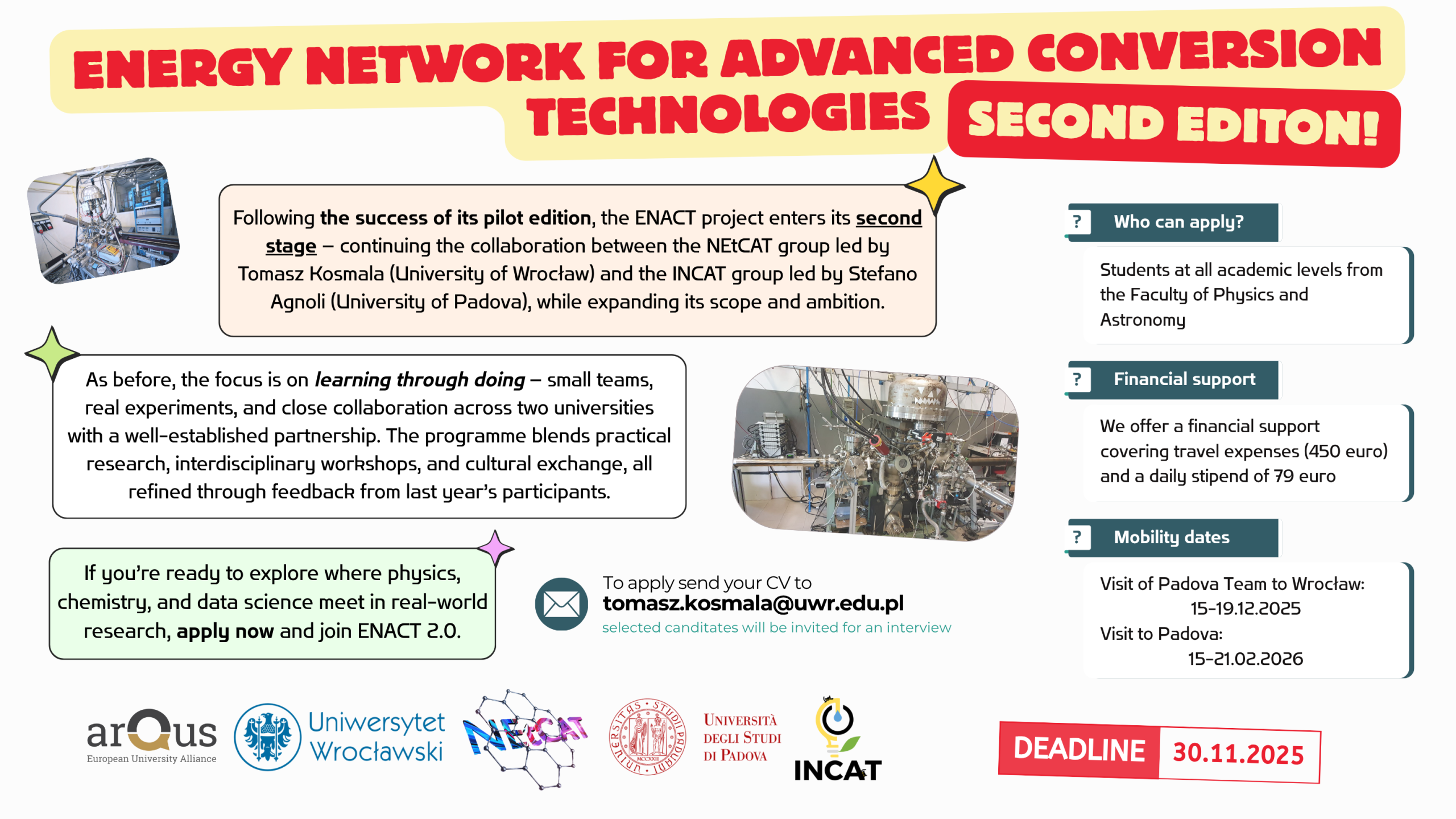
Call for Applications: ENACT 2.0 – Energy Network for Advanced Conversion Technologies
After last year’s success, the ENACT project is back for its second edition! 🌿⚡
ENACT 2.0 continues the collaboration between the University of Wrocław and the University of Padova, deepening a partnership that has been growing for nearly a decade at the crossroads of materials science, electrochemistry, and data-driven innovation.
Last year’s edition brought together talented students and researchers from both universities for two unforgettable weeks in Padova and Wrocław — filled with hands-on lab sessions, lively discussions, and moments of real connection. The results? New skills, shared ideas, and collaborations that continue to flourish. You can catch a glimpse of the experience in our short films from both exchanges — they capture perfectly the energy and curiosity that define ENACT. 🎬
Building on that momentum, ENACT 2.0 will once again unite students from both universities in an interdisciplinary training program that blends Green Revolution science (materials chemistry, electrocatalysis, energy conversion) with Digital Revolution tools (machine learning, data analysis, 3D design).
What Awaits You
Participants will dive into a week-long program of intensive, hands-on training combining:
- Electrochemical Scanning Tunnelling Microscopy (EC-STM) – from sample prep to molecular imaging
- Advanced tip-coating and UHV/XPS techniques for surface and interface studies
- 3D modelling and printing of custom lab components
- Data analysis and machine-learning workshops, including Deep Image Prior (DIP) methods for data denoising
- Collaborative “mini-projects” and discussion sessions with peers and mentors from both institutions
ENACT 2.0 will also feature cultural and networking activities, making space for both scientific exchange and the friendships that make collaboration last.
Mobility Dates:
- Visit of the Padova team to Wrocław: December 15 – December 19, 2025
- Visit to Padova: February 15 – February 21, 2025
We Offer
- A place in a vibrant international research team working on next-generation materials for energy storage and conversion
- Financial support covering travel expenses (€450 per person) and a daily stipend (€79 per day).
- Access to state-of-the-art research facilities and advanced experimental techniques
- Personal mentorship and opportunities for collaboration on future research projects
Eligibility:
- Open to Bachelor’s, Master’s, and PhD students of the Faculty of Physics and Astronomy, University of Wrocław
- Applicants should be curious, motivated, and eager to explore interdisciplinary research at the intersection of physics, chemistry, and data science
- Team-spirit and a willingness to learn by doing are key
How to Apply
Send your CV and a short motivation letter to to tomasz.kosmala@uwr.edu.pl.
Deadline for Applications: 26 November 2024 (selected candidates will be invited for an interview)
Why Join ENACT 2.0?
The first edition showed what’s possible when science meets collaboration — participants came away not only with new skills, but also with a sense of shared purpose. This year’s edition will take things even further, integrating advanced data-driven tools and new inquiry-based learning methods.
ENACT 2.0 will:
- Strengthen international cooperation between Wrocław and Padova
- Enhance technical and analytical competencies
- Inspire future research proposals and publications
- Contribute to Europe’s green and digital transition
Join us and be part of this growing network of young scientists shaping the future of sustainable energy research. 🌍✨
11/11/2025
Conference
IX Congress of the Polish Vacuum Society Held at the Institute of Experimental Physics
On September 25–26, 2025, the Institute of Experimental Physics hosted the IX Congress of the Polish Vacuum Society (PTP) — a national meeting bringing together scientists, engineers, and industry professionals working in vacuum science and technology.
The event provided an excellent platform for sharing experiences, fostering collaboration, and discussing the latest advances and applications of vacuum technologies across research and industry. It was also the occasion of the PTP General Assembly, during which the new Board and President-elect for the 2025–2028 term were elected.
Thanks to the dedication and effort of the organizing committee — which included Dr. Tomasz Kosmala and Dr. Radosław Wasielewski — the congress proceeded smoothly and successfully. The two days were filled not only with engaging talks and discussions but also with the joy of reconnecting with many familiar faces from across the Polish vacuum science community.
2025
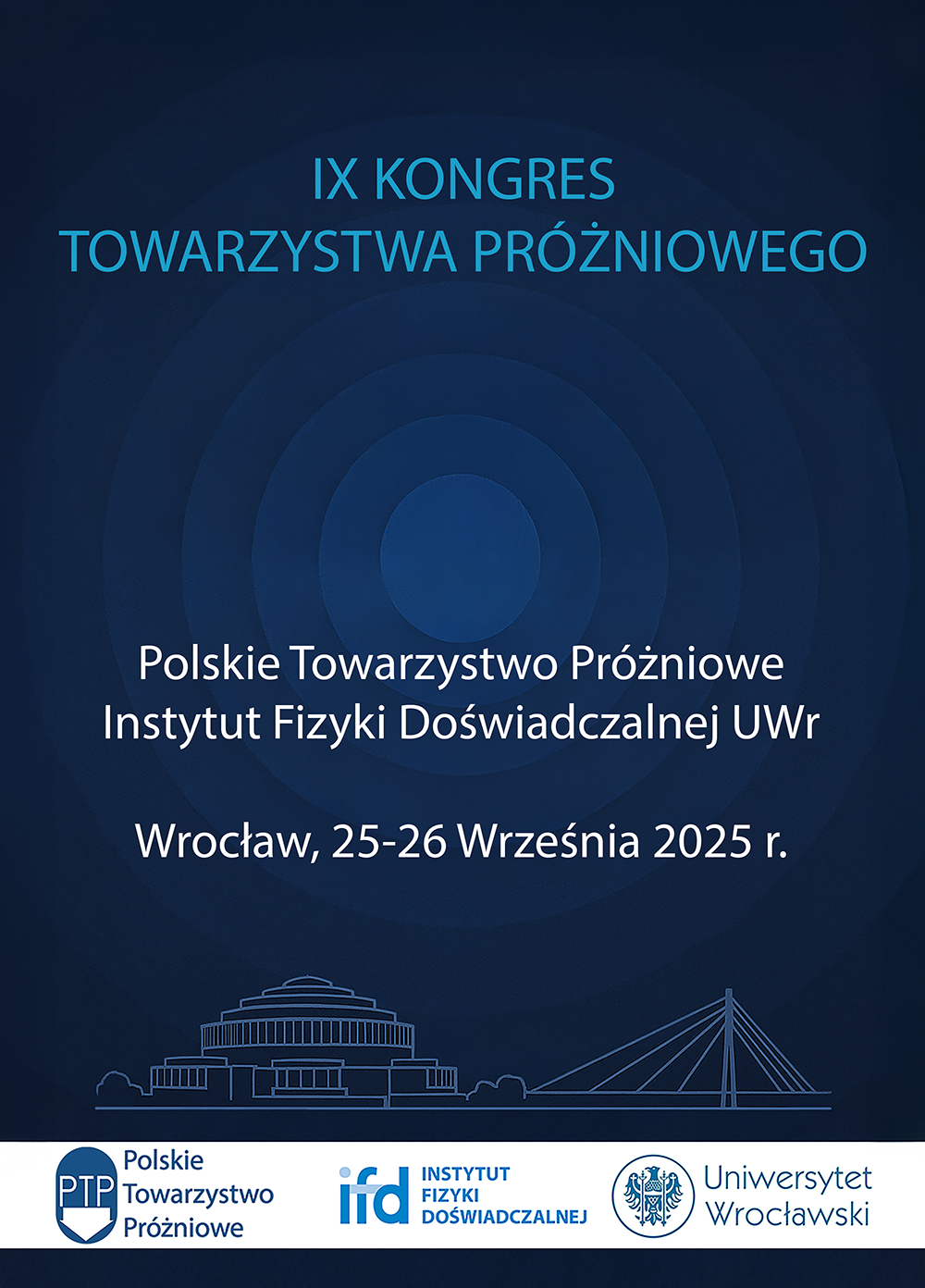
Conference
NEtCAT Team at FisMat 2025
From July 7–11, our NEtCAT team participated in FisMat 2025, an internationally renowned conference bringing together leading researchers in condensed matter physics, held this year in the enchanting city of Venice. 🌊✨
Dr. Tomasz Kosmala was invited to speak at the thematic workshop “Unveiling the Solid–Liquid Interface: Microscopic and Spectroscopic Insights”, where he also served as one of the workshop’s co-organizers alongside colleagues Gianlorenzo Bussetti and Rossella Yivlialin from Politecnico di Milano and Marek Nowicki from the University of Wrocław.
His invited talk, “2D Materials for Advanced Energy Storage and Catalytic Applications Explored by EC-STM,” highlighted recent advances in understanding how two-dimensional materials drive key electrochemical reactions — from hydrogen evolution to energy conversion — using cutting-edge in situ techniques.
NEtCAT’s younger researchers also made their mark at the conference:
- Robert Kurczak showcased his work through a poster, “Highly Reproducible Automated Tip Coater for In Situ and Operando EC-STM Measurements,” presenting an innovative instrument developed as part of his engineering thesis and now published in Surfaces.
- Paulina Wira presented “Watching Catalysis Unfold: In Operando EC-STM Insights into Oxygen Reduction Reaction Driven by a 2D Molecular Network,” offering a glimpse into the real-time behavior of catalytic systems.
- Anna Futyma gave a presentation titled “Probing the Interface: TMPyP Surface Chemistry on Iodine-Modified Au(111) Explored by EC-STM,” continuing her exploration of molecular interactions at electrified surfaces.
The workshop turned out to be one of the longest and most well-attended sessions of the entire conference — a testament to the relevance and scientific depth of the research presented. The lively discussions and exchange of ideas reflected the growing interest in understanding the solid–liquid interface through advanced microscopic and spectroscopic methods.
Beyond the lectures and presentations, FisMat 2025 was also a reunion of familiar faces and collaborators — a wonderful opportunity to strengthen international connections, share new insights, and enjoy the inspiring atmosphere of Venice. 🇮🇹🌅
We’re proud of our team for their excellent contributions and for representing NEtCAT and the University of Wrocław among the leading voices of the international condensed matter community.
2025
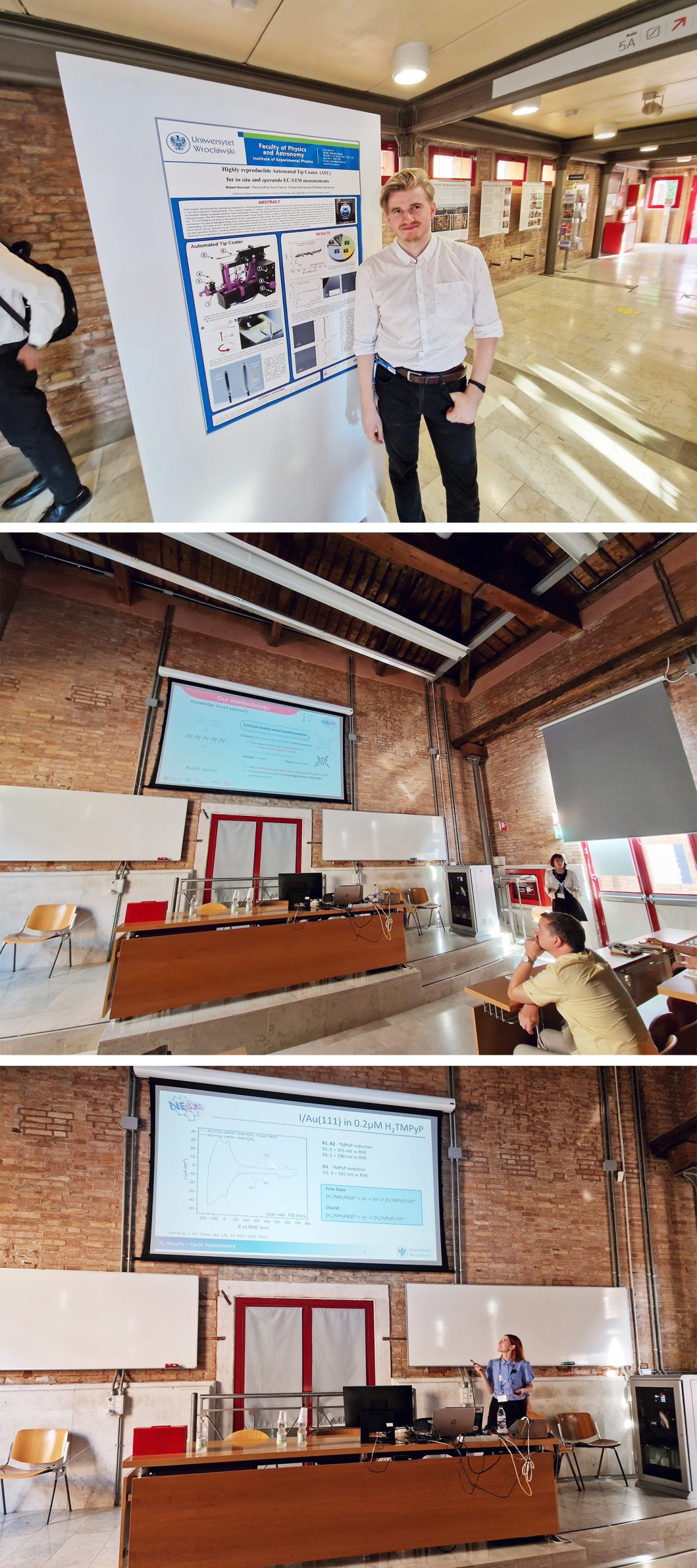
Project
Anna Futyma Expands Her Research Horizons at Politecnico di Milano
We’re delighted to share that Anna Futyma spent the month of May 2024 at the Department of Physics, Politecnico di Milano, where she carried out a research stay under the supervision of Assoc. Prof. Gianlorenzo Bussetti.
The idea for this collaboration grew during the Symposium on Microscopic Characterization of the Solid/Liquid Interface in Sondalo, Italy, where Anna presented her work and had the chance to discuss it with Prof. Bussetti. The connection between Dr. Tomasz Kosmala and Prof. Bussetti, who have known each other for many years, helped make this research stay possible — and it quickly turned into an exciting opportunity for Anna to broaden her scientific experience.
Her work shed light on potential-dependent transformations and coupled electron–proton transfer processes, advancing our understanding of molecular systems at electrified interfaces.
During her time in Milan, Anna conducted an extensive series of experiments focused on the structural, spectroscopic, and electrochemical properties of TMPyP molecules adsorbed on iodine-modified Au(111) surface using a range of advanced techniques, including electrochemical Raman spectroscopy (EC-Raman), and electrochemical atomic force microscopy (EC-AFM). Her experiments offered new insights into potential-dependent transformations and coupled electron–proton transfer processes — an important step forward in understanding electrochemical interfaces.
The stay was a wonderful opportunity for Anna to grow as a researcher, gain hands-on experience in a new environment, and connect with a group sharing her enthusiasm for surface science. We’re incredibly proud of her curiosity, determination, and the passion she brings to her work — and we can’t wait to see how these new experiences will inspire her future research. 🌟
2025
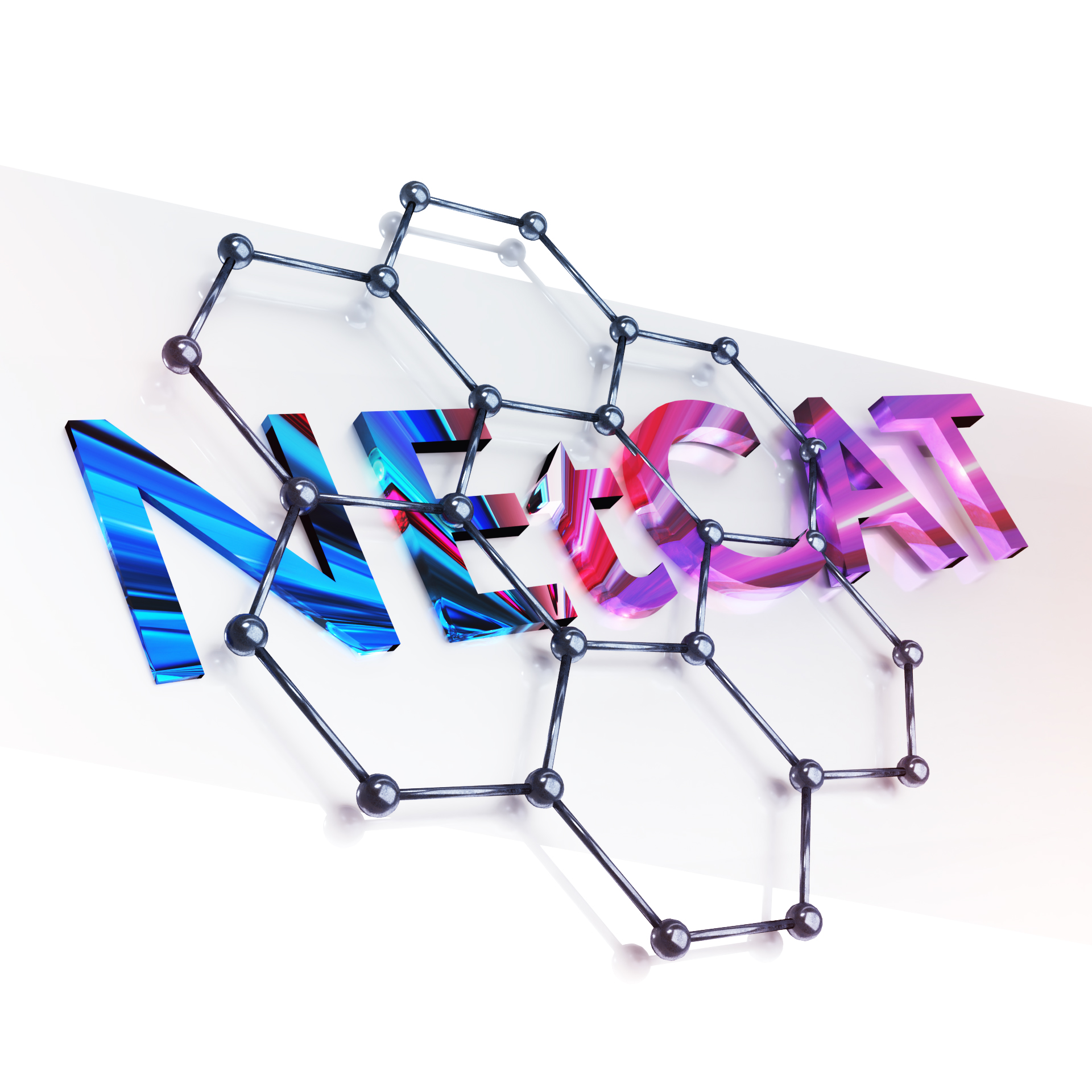
Project
From March 24 to 28, 2025, we had the pleasure of welcoming our colleagues from the University of Padova to Wrocław for the second mobility exchange within the ENACT (Energy Network for Advanced Conversion Technologies) project — a joint initiative between the University of Wrocław and the University of Padova, supported by the Arqus Alliance Twinning 2.0 program.
The week unfolded as a dynamic mix of learning, experimentation, and shared discovery. Participants explored topics at the intersection of the green and digital revolutions — from electrochemistry and EC-STM experiments to machine learning, data analysis, and 3D design and printing of electrochemical cells. Each day offered a new perspective, blending theory with practice and encouraging participants to approach familiar problems in fresh, interdisciplinary ways.
But ENACT was about much more than a series of scientific workshops and lectures. It was a week filled with collaboration, curiosity, and genuine connection — from lively discussions in the lab to shared meals and even a visit to the Wrocław Zoo. These moments outside the lab allowed everyone to get to know one another better, exchange experiences, and strengthen the bonds between our institutions.
It was an inspiring and rewarding week that not only deepened our shared expertise in sustainable energy and materials science but also reaffirmed the importance of collaboration across disciplines and borders.
To capture the atmosphere of the workshop — the science, the teamwork, and the spirit of discovery — we’ve put together a short film from the visit. 🎬
We’re deeply grateful to our colleagues from Padova for their energy, expertise, and enthusiasm, and to the Arqus Alliance for supporting initiatives that bring people, disciplines, and institutions together to tackle the challenges of sustainable energy and materials science. Though this chapter concludes in Wrocław, the ENACT network continues to grow — and so do the ideas born from it. Stay tuned for what comes next! 🚀
2025
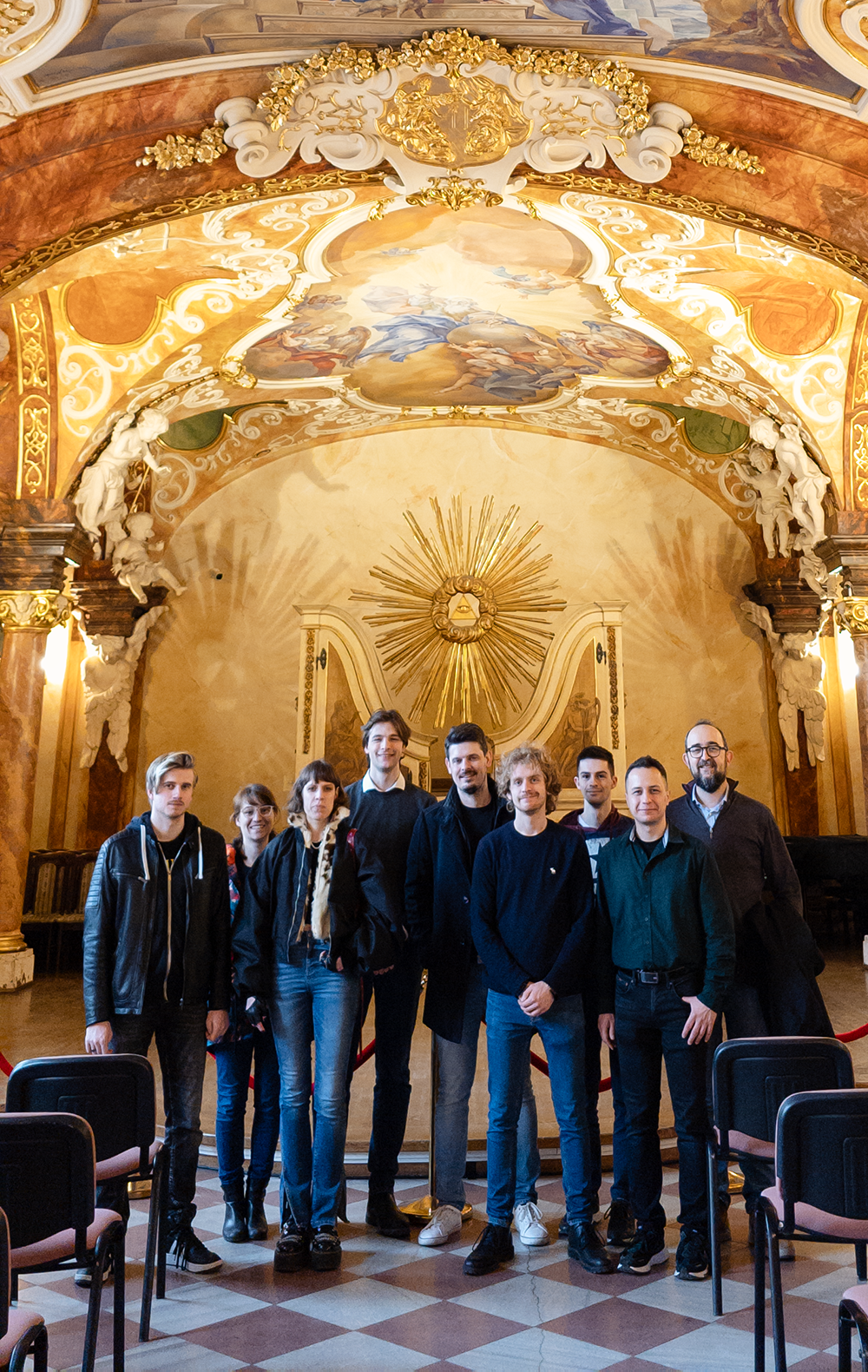
Project
ENACT Begins in Padova: A New Chapter of Collaboration Between Wrocław and Padova
From December 15 to 21, 2024, our NEtCAT team joined colleagues from the University of Padova for the first mobility exchange within the ENACT (Energy Network for Advanced Conversion Technologies) project — a collaborative initiative between the University of Wrocław and the University of Padova.
Throughout the week, participants — students, researchers, and faculty members — came together to explore cutting-edge methods in ultra-high vacuum (UHV) techniques, electrochemical scanning probe microscopy, data analysis, and machine learning applications in materials science. The workshops, lab sessions, and discussions were all aimed at rethinking how we approach sustainable energy research — by merging the worlds of materials chemistry and digital innovation.
But beyond the labs and lectures, the ENACT week was also about building connections. It was filled with collaboration, curiosity, and connection — from lively brainstorming sessions in the lab to evening strolls through Padova’s historic streets. Scientists from both universities had the chance to get to know each other beyond the lab setting, sharing ideas, laughter, and more than a few cups of excellent Italian coffee ☕.
To capture the spirit of the week, we’ve put together a short film from our stay in Padova, highlighting the science, teamwork, and the unforgettable moments that made this exchange so special. 🎬
It was an inspiring and productive experience that strengthened the collaboration between our universities and left everyone eager for the next ENACT chapter — when we’ll have the pleasure of hosting the Padova team in Wrocław this March!
2025
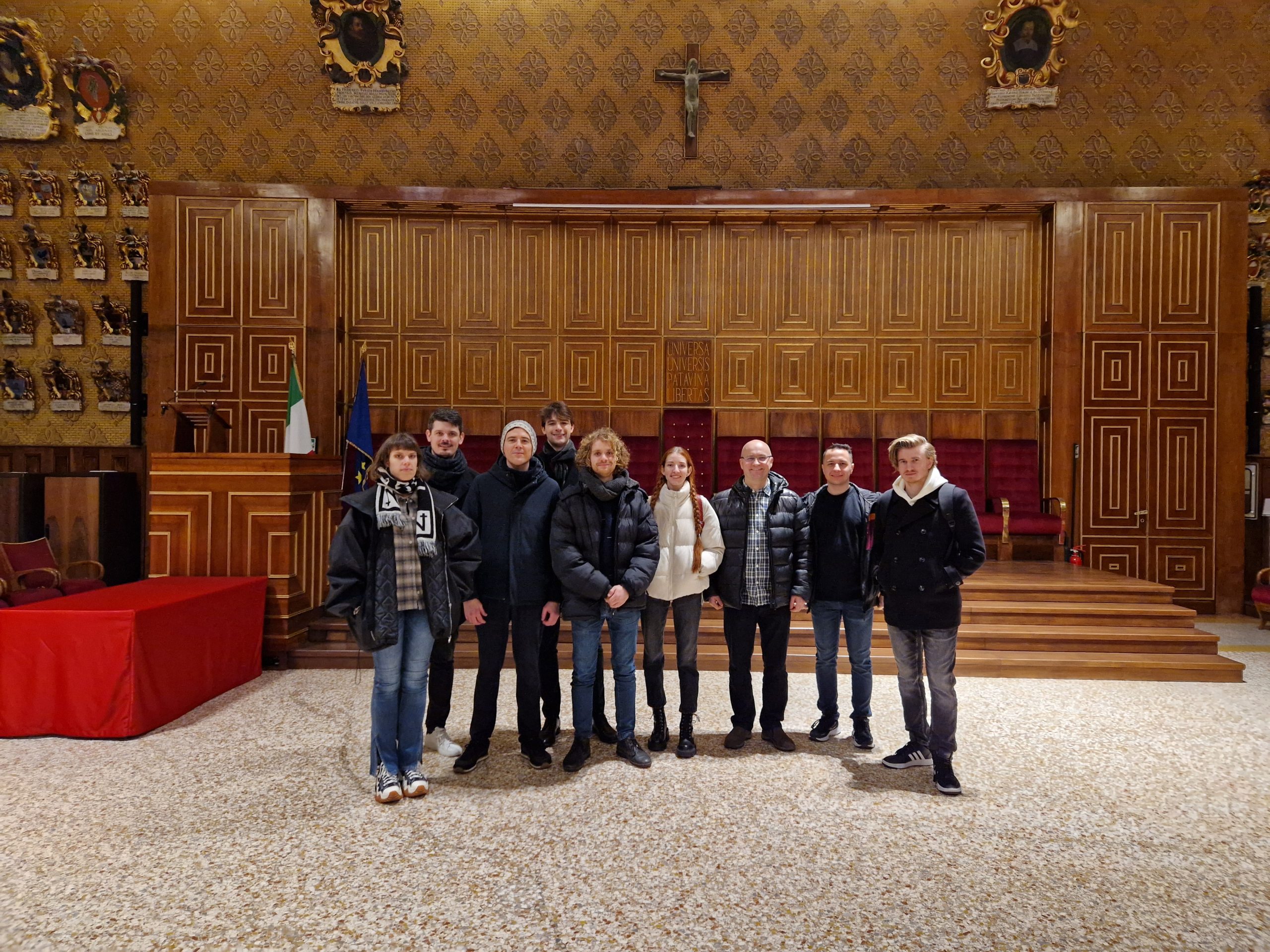
Project
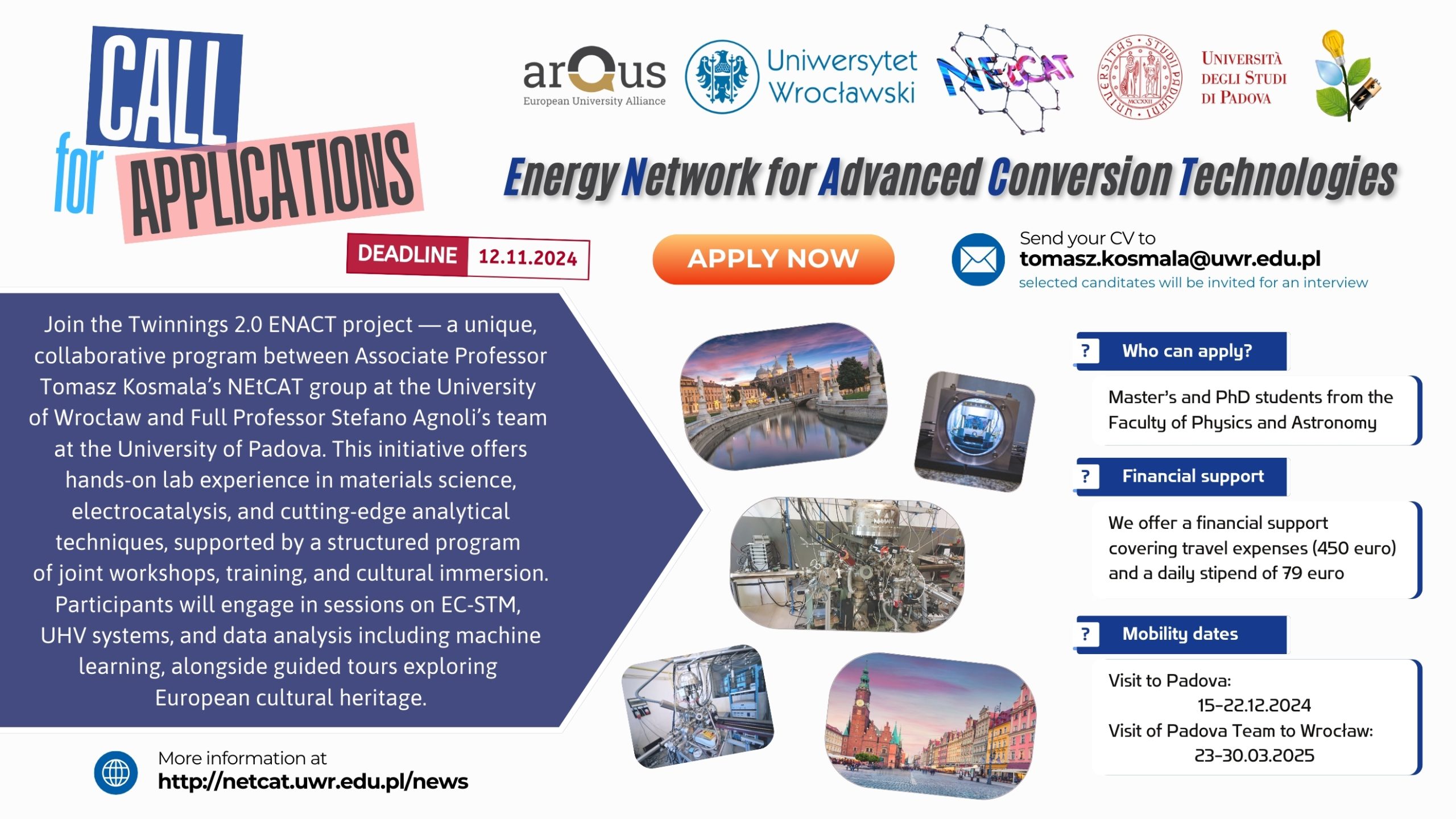
Call for Applications: Twinnings 2.0 – ENACT project
The Energy Network for Advanced Conversion Technologies (ENACT) project is a collaborative initiative between the University of Wrocław and the University of Padova. This program is rooted in a robust research partnership between Associate Professor Tomasz Kosmala and Full Professor Stefano Agnoli, focusing on advanced energy conversion and storage materials. Building on nearly a decade of successful research, ENACT combines expertise in materials science, electrochemistry, and data analysis to push forward advancements in sustainable energy solutions.
Project Background and Goals
The ENACT project aims to strengthen interdisciplinary research by merging the specialized fields of materials science and advanced data analysis with machine learning techniques. This innovative approach integrates the core competencies of the Green Revolution (state-of-the-art materials chemistry, electrocatalysis, and energy conversion) with skills from the Digital Revolution (big data management and AI). This fusion allows researchers to address crucial energy challenges in new, highly efficient ways.
The project’s specific objectives include:
- Training participants in Python-based data analysis and introduction to machine learning applications in materials science, which are critical skills in modern scientific research.
- Enhancing bilateral cooperation between the University of Wrocław and the University of Padova.
- Providing participants with in-depth, hands-on experience in cutting-edge technologies such as electrochemical scanning tunneling microscopy (EC-STM) and ultra-high vacuum (UHV) systems for in-situ XPS and electrochemical studies.
Mobility Dates:
- Visit to Padova: December 15 – December 22, 2024
- Visit of the Padova team to Wrocław: March 23 – March 30, 2025
We Offer:
- Work in an international research team on innovative materials for energy conversion and storage.
- Financial support covering travel expenses (€450 per person) and a daily stipend (€79 per day).
- Intensive workshops and training sessions, including data analysis, EC-STM, and UHV system operations.
Eligibility:
- Open to Master’s and PhD students from the Faculty of Physics and Astronomy.
- Candidates should be highly motivated for research work and capable of working in an international team.
Application Process: To apply, please send your CV to tomasz.kosmala@uwr.edu.pl. Selected candidates will be invited for an interview.
Deadline for Applications: 12 November 2024
Activities and Preliminary Schedule
The ENACT project offers a structured program of joint workshops, training sessions, and cultural immersion activities. During the visit, participants will engage in hands-on lab work, data analysis sessions, and guided tours to explore the historical and cultural heritage of each university.
Sample Itinerary for University of Wrocław Students Visiting Padova:
- Day 1: Arrival, welcome session, and lab tour; introductory discussion on energy conversion technologies.
- Day 2: Workshop on data analysis and machine learning methods; practical lab session with XPS and STM techniques.
- Day 3: Cultural immersion with guided visits to iconic sites in Padova, exploring European Identity heritage.
- Day 4: Hands-on training with UHV systems; data analysis session.
- Day 5: Presentation of findings, feedback, and planning for future collaborations.
The same structured approach will be applied when students from Padova visit the University of Wrocław, ensuring both theoretical and practical exposure to advanced materials science techniques.
Impact and Future Development
The ENACT project is expected to significantly impact the involved institutions by fostering sustained research collaboration, enhancing the participants’ technical and analytical skills, and encouraging the development of new courses and workshops. It aligns with the broader objectives of the Arqus European University Alliance, supporting digital transformation, AI integration, and environmental sustainability.
04/11/2024
Publication
New Publication: Automated Tip Coater for EC-STM Measurements — Congratulations to Robert Kurczak and the NEtCAT Team! 🎉
We’re thrilled to share that our paper “Highly Reproducible Automated Tip Coater for In Situ and Operando EC-STM Measurements” has been published in Surfaces! This publication marks an exciting milestone for the NEtCAT team, as it presents a practical innovation that makes electrochemical scanning tunneling microscopy (EC-STM) measurements more reliable and efficient.
The study introduces an Automated Tip Coater (ATC) — a device that standardizes and automates the delicate process of coating STM tips, ensuring high-quality insulation and reproducibility. The system combines precise motor control, heating, and user-friendly operation, all managed through an Arduino-based interface. The results speak for themselves: over 75% of tips coated with the ATC achieved excellent insulation performance, making it a valuable tool for sensitive EC-STM experiments.
This achievement is especially meaningful because the project began as an engineering degree thesis by NEtCAT’s own Robert Kurczak, whose creativity and technical skill turned a clever idea into a working prototype — and eventually, a full publication. It also reflects the collaborative spirit of our team, with many members contributing their expertise along the way.
We’re incredibly proud of Robert and everyone involved in this project for their dedication, innovation, and teamwork. Congratulations to the whole NEtCAT team on this well-deserved success!
Read the full article: [Link to the article]
28/11/2024
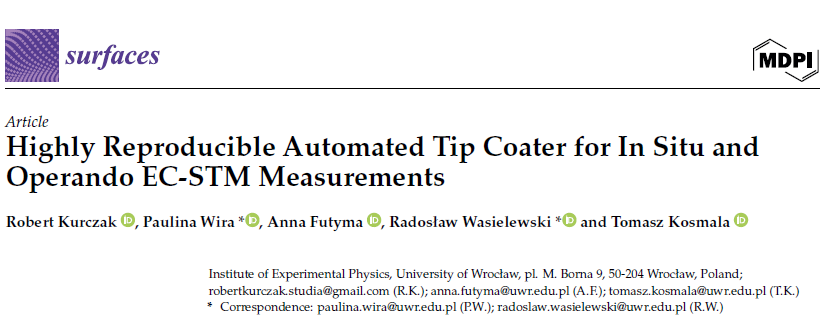
Lecture
Kicking Off the Academic Year: Inaugural Lecture by Dr. Tomasz Kosmala and Paulina Wira
The Faculty of Physics and Astronomy at the University of Wrocław welcomed the new academic year with the traditional immatriculation ceremony for first-year students on 4 October 2024 in the Aula Leopoldyńska.
As part of the ceremony, Dr. Tomasz Kosmala and Paulina Wira delivered the inaugural lecture, titled “A Journey Across the Plains of 2D Materials: What Model System Studies with Electrochemical Scanning Tunneling Microscopy Can Tell Us About Electrocatalysis.” Their talk introduced incoming students to the fascinating world of 2D materials and electrocatalysis, combining cutting-edge research with accessible explanations for those just beginning their studies in physics.
The lecture was a wonderful opportunity to spark curiosity and excitement among first-year students, giving them a glimpse into the cutting-edge research on 2D materials and electrocatalysis. It was also a proud moment for the NEtCAT team to share their passion and enthusiasm for science with the next generation of physicists.
Photo by Paweł Piotrowski
8/10/2024
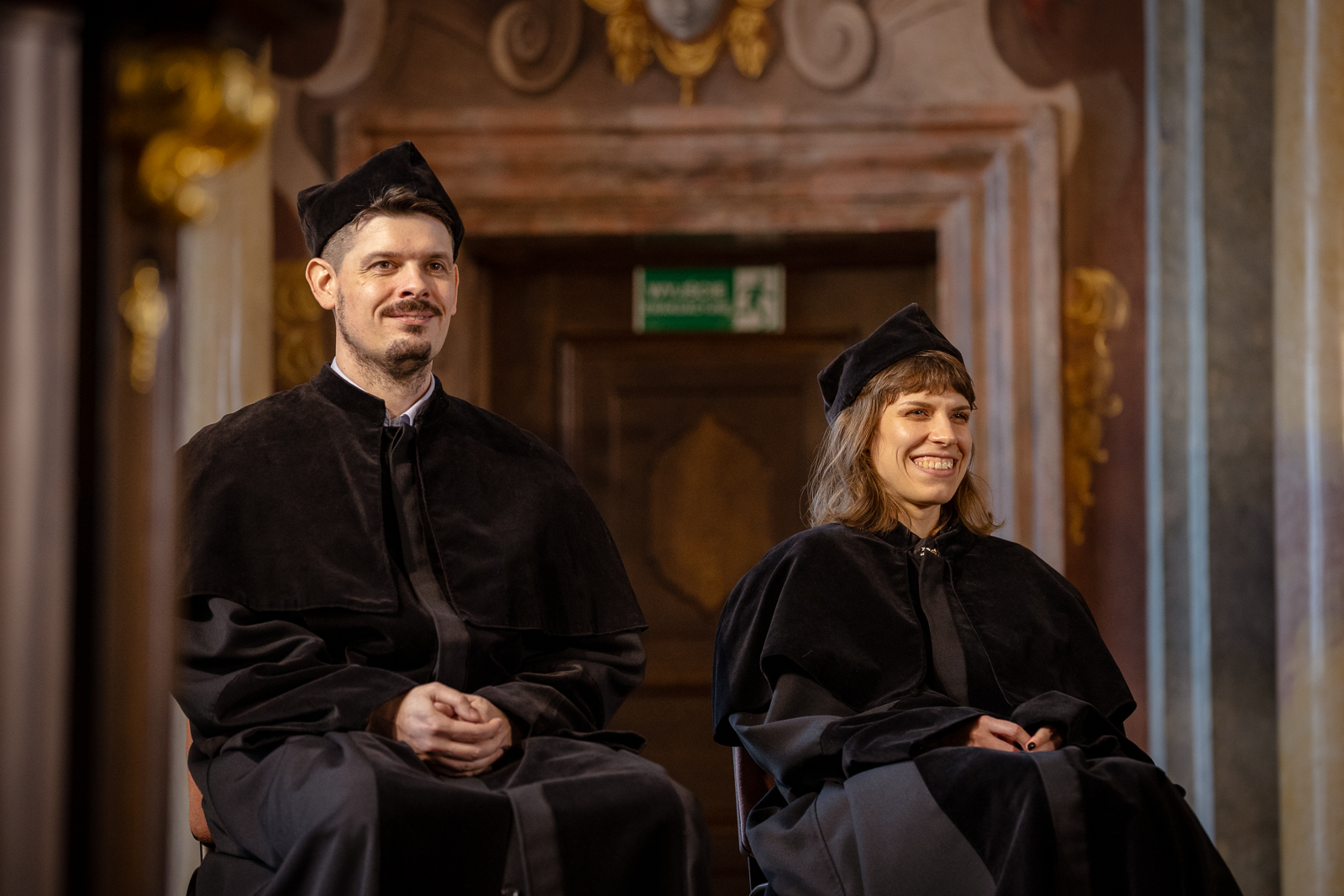
People
Congratulations to Radosław Wasielewski on His Appointment as Associate Professor
We’re delighted to share that Dr. Radosław Wasielewski has been appointed as an Associate Professor at the Institute of Experimental Physics, University of Wrocław. This well-earned promotion recognises his dedication to both research and education, as well as his exceptional contributions to our academic community.
Radosław’s expertise spans measurement interfaces, data acquisition systems, and the design and construction of electronic and mechanical systems. Within the NEtCAT team, he is known for his deep technical knowledge and hands-on approach — the colleague everyone turns to when something needs to be built, fixed, or fine-tuned.
His guidance has been invaluable to students and collaborators alike. Beyond his research and technical work, Radosław stands out for his innovative teaching methods, mentorship of young scholars, and ongoing efforts to raise educational standards within our community. His commitment reflects not only personal excellence but also the vital role of educators in shaping future generations of scientists.
We warmly congratulate Radosław on this achievement and look forward to his continued contributions to both our group and the wider scientific community.
2/10/2024
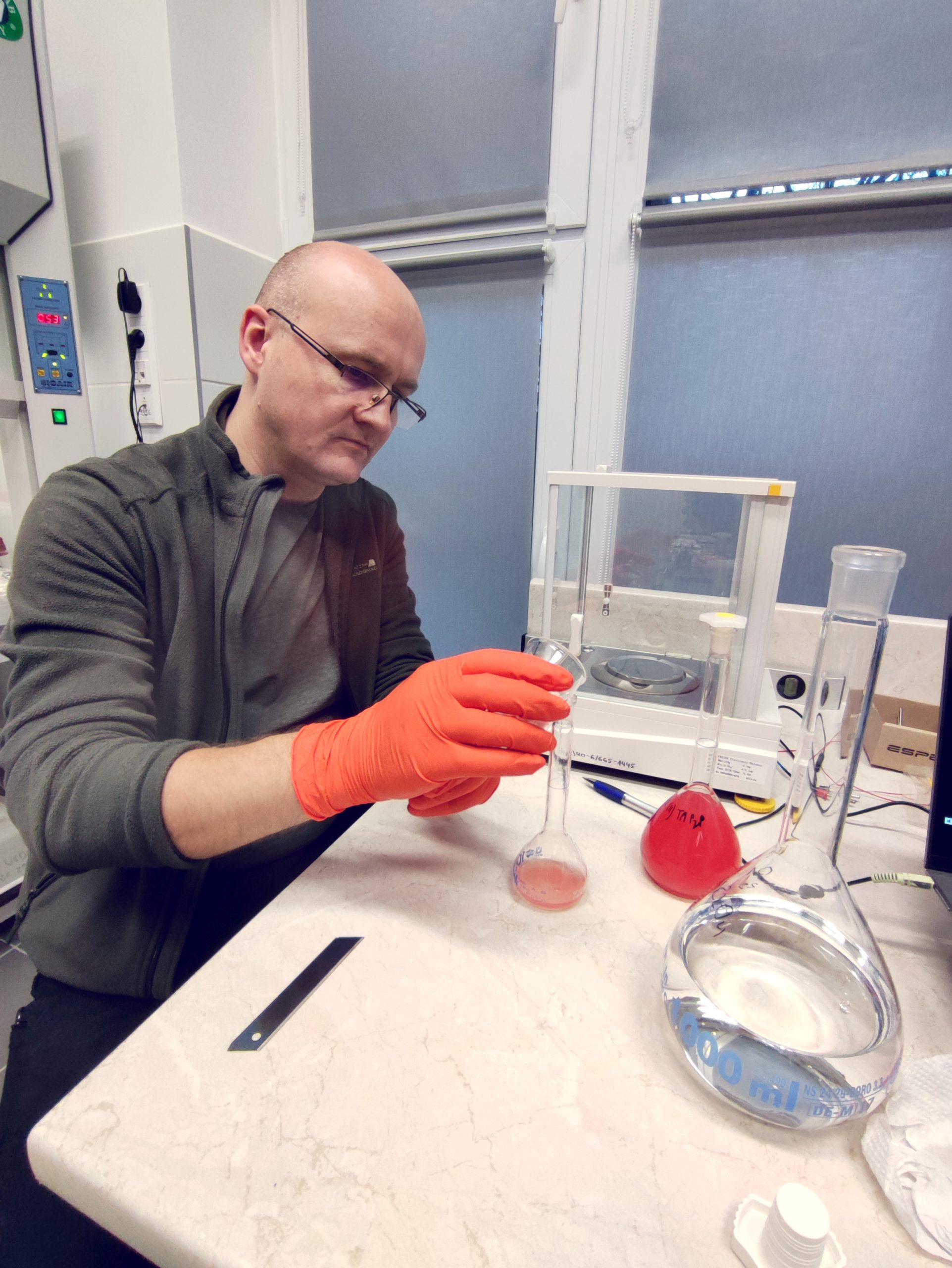
Conference
NEtCAT Team at IWSP 2024
The NEtCAT team recently attended IWSP 2024, the 10th International Workshop on Surface Physics, held on 22–26 September 2024. Organized by the Institute of Experimental Physics at the University of Wrocław, IWSP is a long-standing series of specialized conferences that bring together researchers from around the world to discuss the latest advances in surface science.
This year’s workshop, themed “Atoms, Molecules, and All Other Things at the Surfaces,” provided an excellent platform to share research, exchange ideas, and explore new directions in the field. The picturesque setting near Wrocław offered a relaxed yet inspiring environment for scientific discussion.
Our team had a strong presence at the conference. Dr. Tomasz Kosmala delivered an invited talk on “Revealing Active Sites and Boosting Catalytic Performance in 2D Materials for Hydrogen Evolution Reaction”. Anna Futyma presented her work on “Elucidating the Surface Chemistry of TMPyP on Iodine-Modified Au(111) by EC-STM Study”, while Paulina Wira shared her research on “Exploring 2D Molecular Networks as Single-Atom Catalyst Models for Oxygen Reduction Reaction Using EC-STM”. Radosław Wasielewski and Rafał Lewandków contributed through poster presentations, highlighting advances in in situ measurement techniques and nanoscale patterning at solid-liquid interfaces.
It was a fantastic opportunity for the team to showcase our research and engage with the international surface science community. Beyond the presentations, the workshop offered moments of collaboration, discussion, and inspiration, leaving everyone energized and full of ideas to bring back to the lab for future projects.
2024
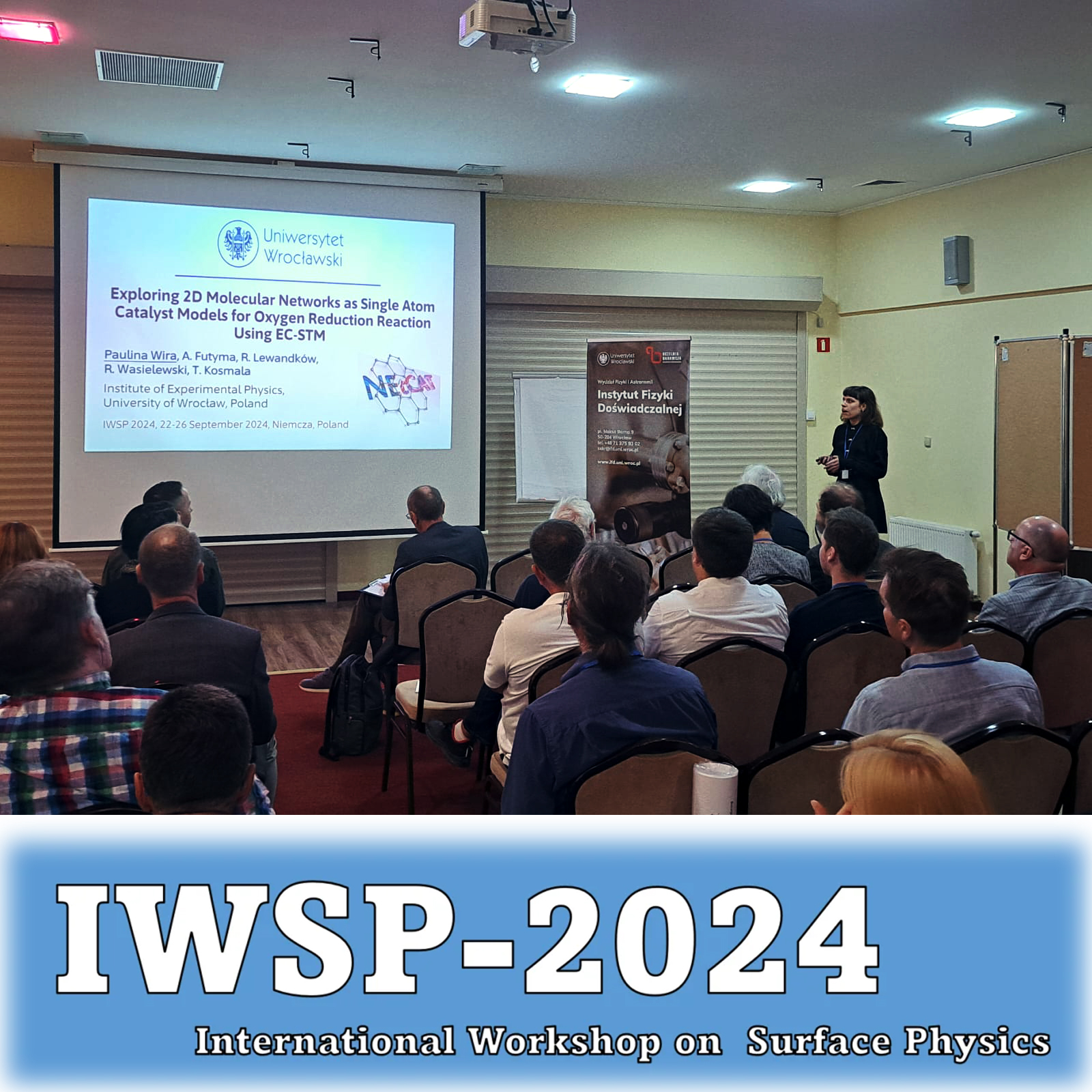
People
Congratulations to Paulina Wira on Her Master Thesis Defense and Acceptance into the Doctoral Program!
We are pleased to share that Paulina Wira has successfully defended her Master’s thesis, completed under the supervision of Dr. Tomasz Kosmala. Following this achievement, Paulina has been accepted into the Doctoral Program at the Faculty of Physics and Astronomy, University of Wrocław.
Her research focuses on 2D molecular networks as single-atom catalyst models for the oxygen reduction reaction, using electrochemical scanning tunnelling microscopy (EC-STM) to investigate these systems in detail.
We look forward to continuing our collaboration with Paulina as she begins her doctoral studies and further develops her research in this area.
2024

People
Celebrating Anna Futyma’s and Robert Kurczak Acceptance into the Master’s Program at the Faculty of Physics and Astronomy!
We’re delighted to share some exciting news from the NEtCAT team!
Anna Futyma, our dedicated Technician Assistant and a much-valued member of the team, has been accepted into the Master’s program in Experimental Physics at the Faculty of Physics and Astronomy, University of Wrocław. This will be Anna’s second Master’s degree — a reflection of her curiosity and commitment to continuous learning. Her decision to take on this new challenge was inspired by her hands-on work in the NEtCAT lab, where she has been exploring iodine adsorption on single metal surfaces. Through this program, she’ll deepen her understanding of experimental physics and strengthen the foundations that support her research interests.
Joining her in this exciting academic journey is Robert Kurczak, another highly valued member of our team. His passion for practical solutions in laboratory work and programming has driven his research on experimental set-ups — including his standout work on the Automated Tip Coater (ATC). Robert has been accepted into the Master’s program in Computational Physics, and his ambition to combine programming, experimental upgrades, and scientific research continues to inspire us all. Successfully balancing work and study, Robert exemplifies curiosity, dedication, and the drive to make science both innovative and efficient.
We’re excited to see how these new chapters will shape Anna’s and Robert’s research journeys and can’t wait to follow their discoveries along the way. Congratulations, Anna and Robert! 🎉
2024

Conference
Exploring 2D Materials for Clean Energy: Tomasz Kosmala at the 9th Polish Conference on “Graphene and Other 2D Materials”
We’re happy to share that our colleague Tomasz Kosmala gave an invited talk at the 9th Polish Conference on “Graphene and Other 2D Materials” in Poznań, Poland (September 8–10, 2024).
In his presentation, “Revealing Active Sites and Boosting Catalytic Performance in 2D Materials for Hydrogen Evolution Reaction,” Tomasz delved into the fascinating world of electrocatalysis and how clever design at the atomic level can make clean hydrogen production more efficient.
He discussed new ways to uncover where the real catalytic action happens, using advanced in situ and operando techniques to look at materials with atomic-level precision. Tomasz also shared creative strategies to make catalysts perform better, from using intrinsic defects like metallic twin boundaries in chalcogenides, to exploring electron hybridisation effects in Fe/graphene systems, and even single-atom catalysis.
It was an inspiring talk that reflected not only Tomasz’s expertise but also his enthusiasm for sustainable energy research. We’re proud to see his work contributing to the broader conversation on clean energy and look forward to seeing where these ideas lead next!
2025
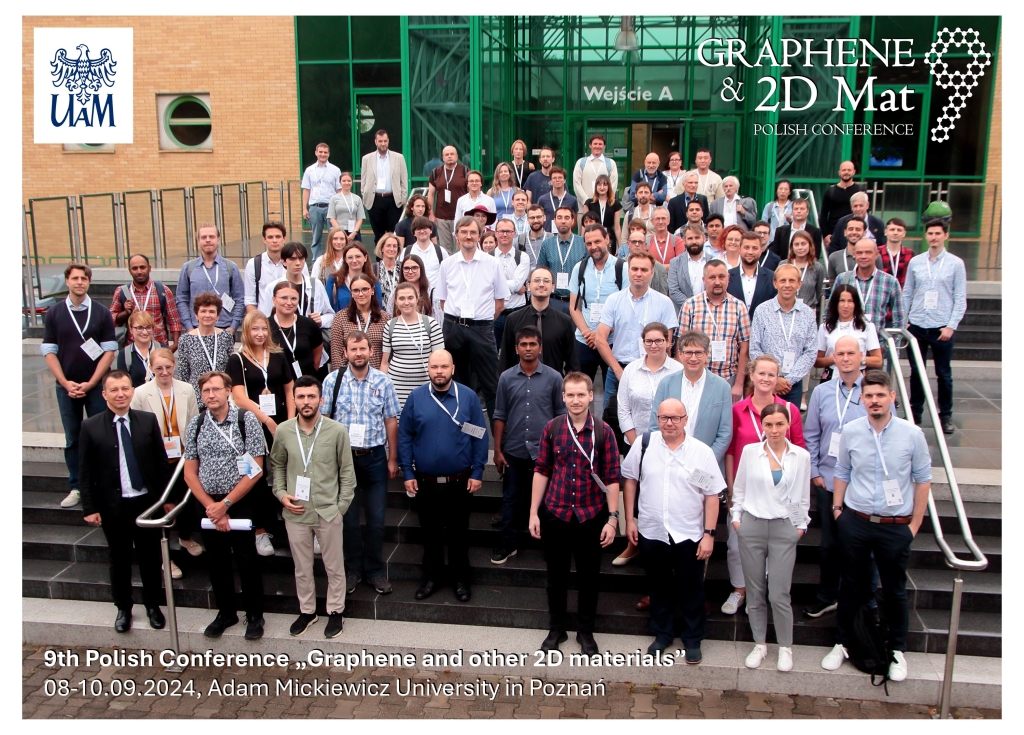
Conference
Anna Futyma and Tomasz Kosmala Shine at International Symposium in Sondalo, Italy
We’re excited to share that two of our group members, Anna Futyma and Tomasz Kosmala, recently participated in the Symposium on Microscopic Characterization of the Solid/Liquid Interface, which took place in the picturesque town of Sondalo, Italy, from June 21st to 25th, 2024. The event brought together both young researchers and leading experts from across the globe, creating a fantastic space for collaboration and knowledge exchange. We were thrilled to be part of it!
Anna Futyma gave a compelling presentation titled “Elucidating the Surface Chemistry of TMPyP on Iodine-Modified Au(111) by EC-STM Study.” Her research explored how TMPyP molecules interact with the modified gold surface, uncovering unique molecular arrangements and changes in electronic properties. Her findings could have significant applications in fields like molecular electronics and sensor technology.
Meanwhile, Tomasz Kosmala was invited to give a lecture on “Tuning Graphene-Metal Interactions for Advanced Energy Storage and Catalytic Applications.” He discussed how graphene, when combined with metals such as platinum, ruthenium, and iron, can be optimized for better energy storage and catalytic performance. His use of EC-STM allowed him to visualize atomic-level interactions, providing deep insights into the mechanisms behind these processes. Being invited to speak at the event highlights Tomasz’s important contributions to sustainable energy research.
We’re incredibly proud of Anna and Tomasz for representing our team at such an engaging and forward-thinking event. Congratulations to them both on their successful presentations, and we can’t wait to see the exciting developments in their future work!
02/08/2024
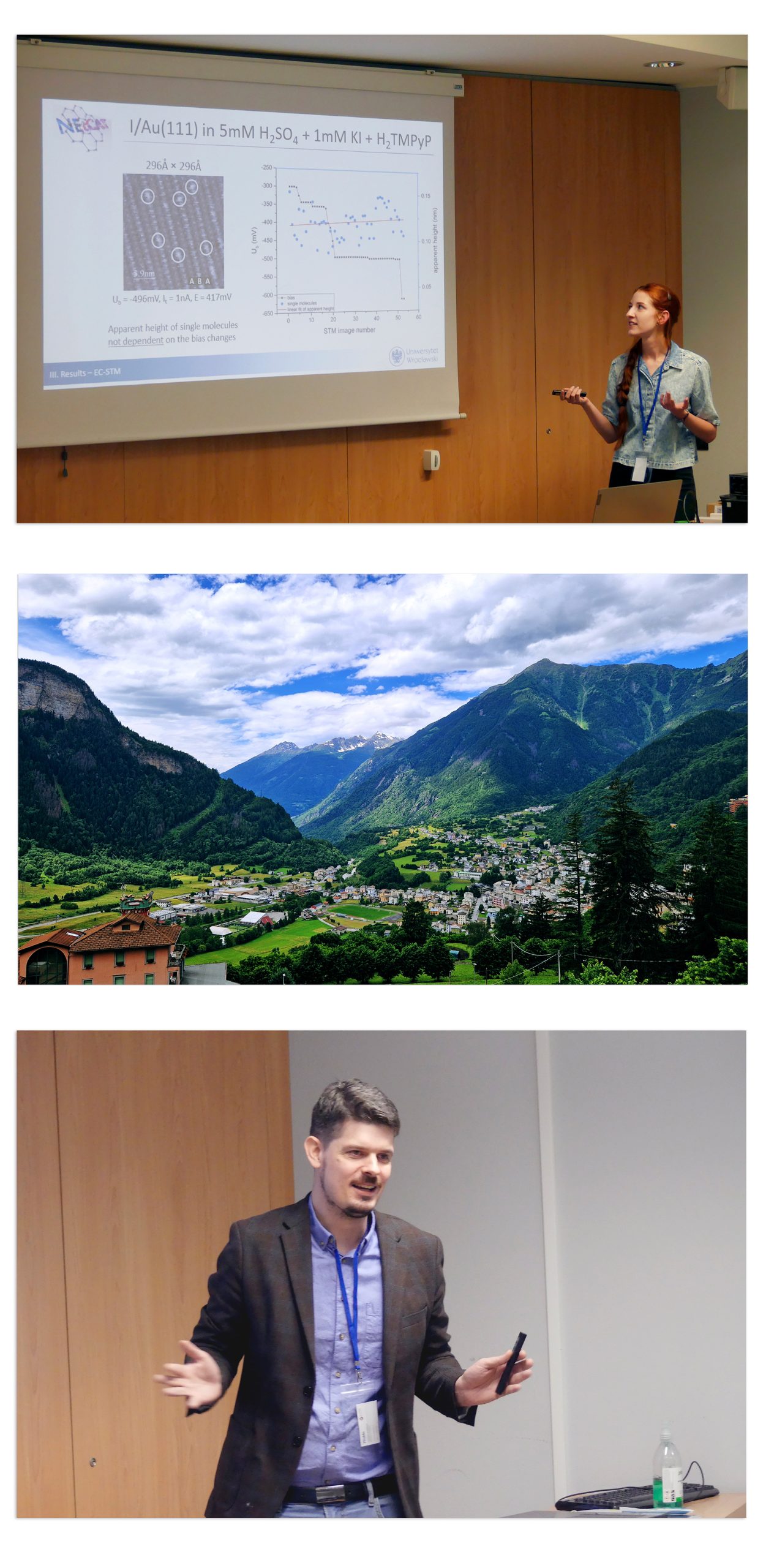
Conference
NEtCAT Group Achievement: Paulina Wira Presents at ICASS 2024
We are pleased to announce that Paulina Wira, a master student in our group, recently presented her research at the 6th International Conference on Applied Surface Science (ICASS). The conference took place from June 17-20, 2024, at the Waterside Hotel in Wuzhen, Zhejiang, China, and was organized by the journal Applied Surface Science (Elsevier).
Paulina’s presentation, titled „Exploring 2D Molecular Networks as Single Atom Catalyst Models for Oxygen Reduction Reaction Using EC-STM,” showcased the results of her master thesis research under the supervision of Tomasz Kosmala. Her work focuses on the oxygen reduction reaction (ORR), a critical process in fuel cells, which offers alternatives to non-renewable fossil fuels.
In her study, Paulina investigated single-atom catalysts (SACs) based on ternary M-N-C materials. By exploring the influence of different metal centers and substrates, she discovered significant enhancements in catalytic performance.
This achievement was supported by funding from IDUB and NCN, highlighting the high caliber of research within our group. We are proud of Paulina’s hard work and success in presenting at this international platform.
Congratulations, Paulina, on this accomplishment!
02/07/2024
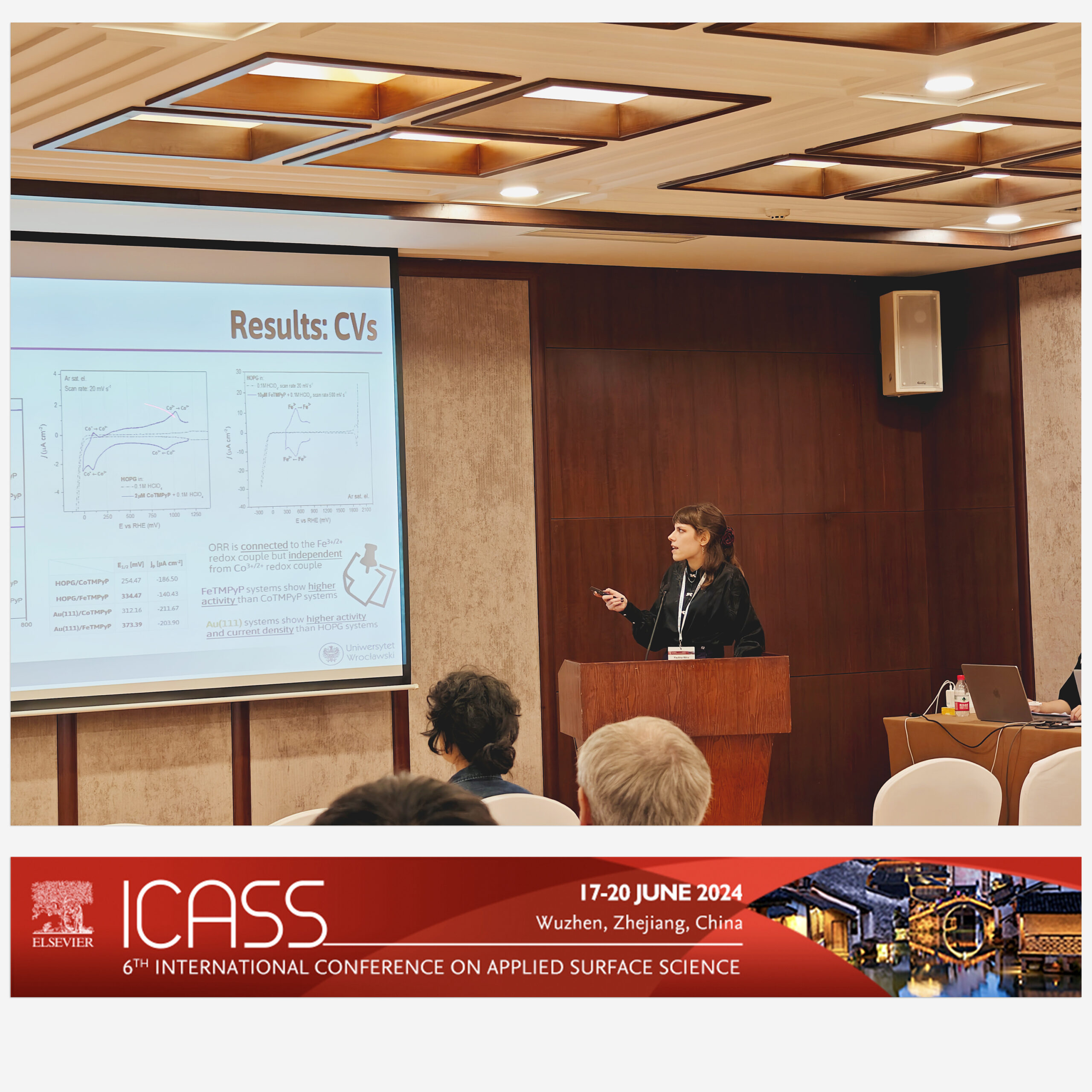
Project
Our Team Secures Funding for Advanced Research Equipment
We are excited to announce that on May 9, 2024, Assoc. Prof. Tomasz Kosmala’s proposal, acronym SPEKTRUM-5, was awarded funding through the second competition for equipping scientific research apparatus under the Research Apparatus Fund at the University of Wrocław. This decision was approved by the Rector on May 14, 2024.
Our team proposal received a score of 74.50 out of 100 from the evaluation team, placing it 7th on the ranking list and securing its status as a winning project.
The Faculty of Physics and Astronomy will receive funding amounting to 195,301.43 PLN from the Research Apparatus Fund, as part of the “Excellence Initiative – Research University” program. This grant will support the SPEKTRUM-5 project, aimed at enhancing UHV equipment for advanced photoelectron spectroscopy research.
Congratulations to NEtCAT team for this significant achievement. We look forward to the advancements this new equipment will bring to our research capabilities.
Stay tuned for further updates on our research initiatives and successes!
18/05/2024
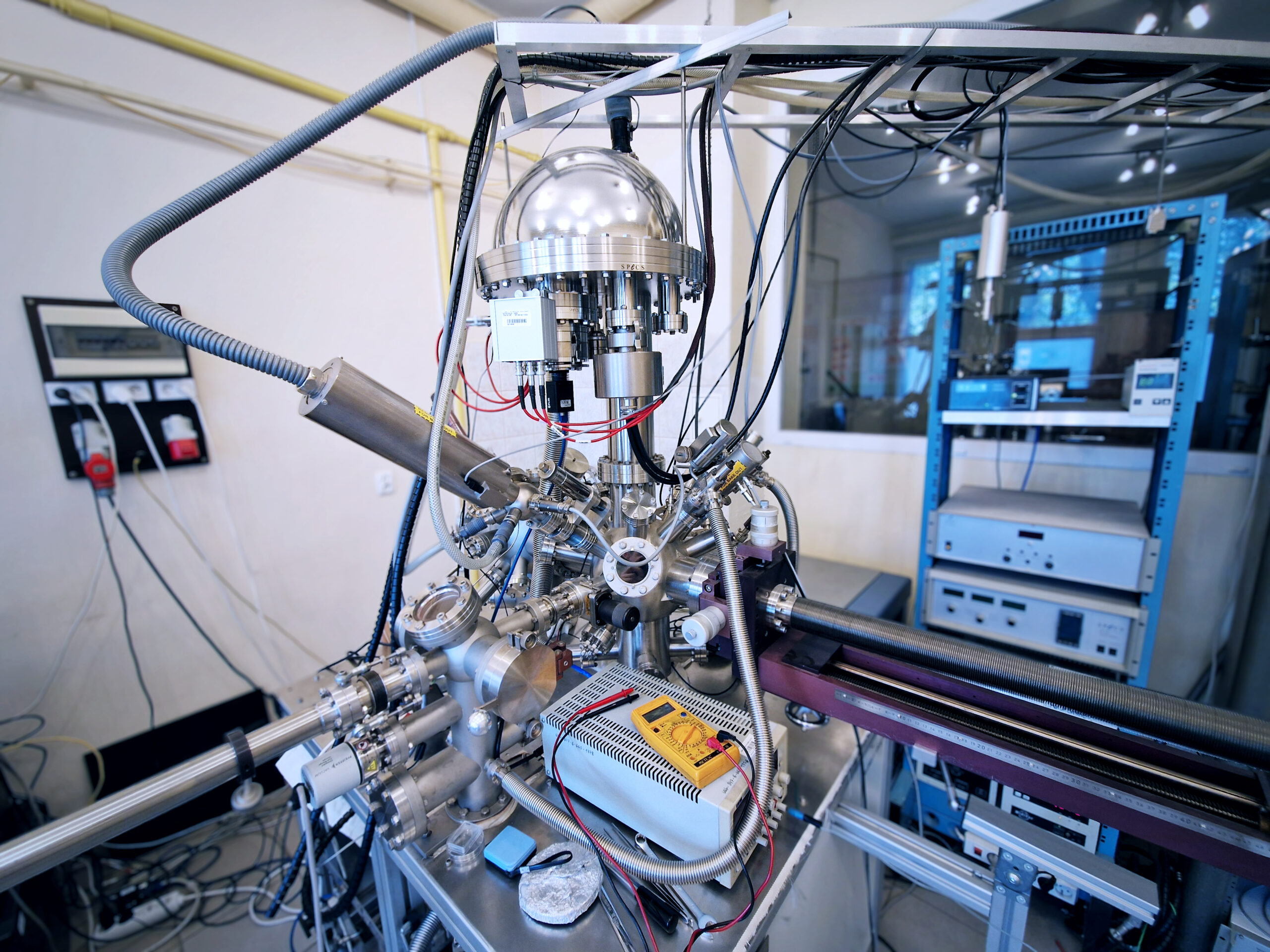
People
Dr. Tomasz Kosmala Appointed Associate Professor at the University of Wrocław
We are pleased to announce that Dr. Tomasz Kosmala has been appointed as an Associate Professor at the University of Wrocław, effective April 1, 2024. This well-deserved appointment recognizes Dr. Kosmala’s outstanding contributions to the field of experimental physics and his dedication to academic excellence.
Dr. Kosmala has been an integral part of our team, consistently pushing the boundaries of research and fostering a collaborative and innovative environment. His work in investigating the correlation between catalyst activity and atomic-level structure, as well as his advancements in the development of electrocatalysts for green hydrogen production, have significantly contributed to the scientific community.
Congratulations to Dr. Kosmala on this remarkable achievement. We look forward to his continued leadership and the groundbreaking research that will undoubtedly follow.
02/04/2024
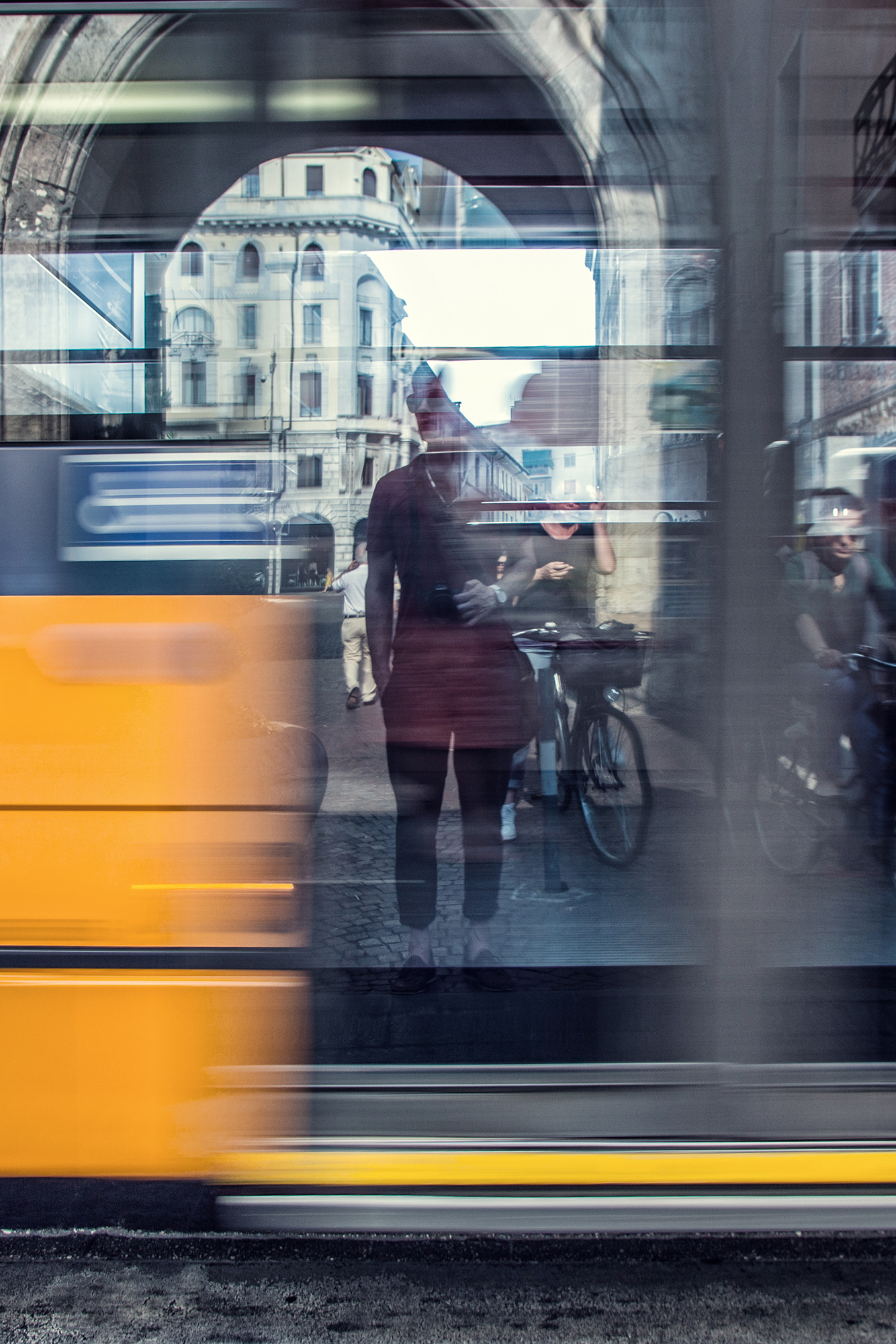
Publication
Featured Publication on the February Cover of the Journal of Physical Chemistry C
We’re proud to announce that research by Tomasz Kosmala, along with his colleagues Radosław Wasielewski, Marek Nowicki, and Klaus Wandelt, has been featured on the cover of the January issue of the Journal of Physical Chemistry C.
Study Title: Unveiling the Interplay between a Au(100) Electrode, Adsorbed TTMAPP Porphyrin Cations, and Iodide Anions: An EC-STM and CV Study
Insightful Findings: The research provides a detailed analysis of the self-assembly processes of TTMAPP porphyrin molecules on a Au(100) electrode. Utilizing techniques such as cyclic voltammetry (CV) and in situ scanning tunneling microscopy (STM), the team identified up to 11 distinct long-range ordered phases. These phases shift solely under the influence of electrode potential, presenting a fascinating view into the dynamic changes occurring at the molecular level.
Impact of the Study: The team’s findings reveal how the presence or absence of iodine on the surface influences the adsorption properties of TTMAPP molecules, thereby affecting the overall molecular assembly. The study also highlights the role of electrode potential scan rate in controlling iodine readsorption, emphasizing the delicate interplay of noncovalent interactions such as van der Waals and electrostatic forces.
Read the full article: [Link to the article]
20/02/2024
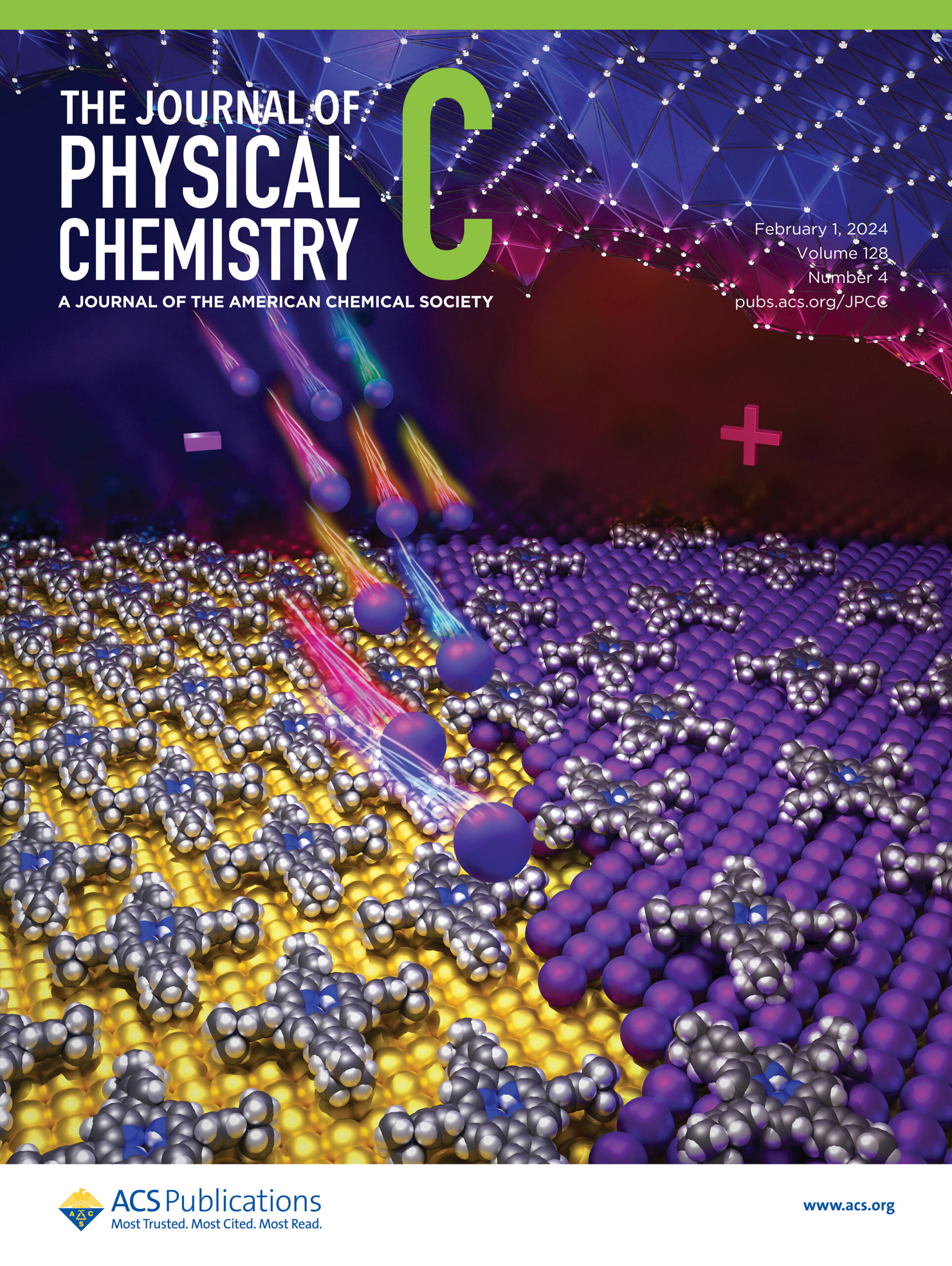
People
Congratulations to Dr. Rafał Lewandków on His Successful PhD Defense!
We are delighted to announce that Rafał Lewandków successfully defended his doctoral dissertation on November 22, 2023. His dissertation, titled „Growth and Morphology of Al2O3 and MgO Layers on SiC(0001) and GaN(0001) Surfaces,” marks a significant milestone in his academic career.
Under the supervision of Prof. Antoni Ciszewski, Rafał conducted extensive research on the growth and morphological properties of Al2O3 and MgO layers on silicon carbide (SiC) and gallium nitride (GaN) surfaces. His work involved the application of various advanced material analysis and surface physicochemistry techniques, including X-ray Photoelectron Spectroscopy (XPS), Scanning Tunneling Microscopy (STM), Atomic Force Microscopy (AFM), Ultraviolet Photoelectron Spectroscopy (UPS), and Low-Energy Electron Diffraction (LEED).
Rafał’s research has provided valuable insights into the material properties and potential applications of these compounds, contributing significantly to the field of surface science and material engineering.
We extend our heartfelt congratulations to Dr. Lewandków and wish him continued success in his future endeavors. Stay tuned for more updates on his groundbreaking work and further achievements.
23/11/2023
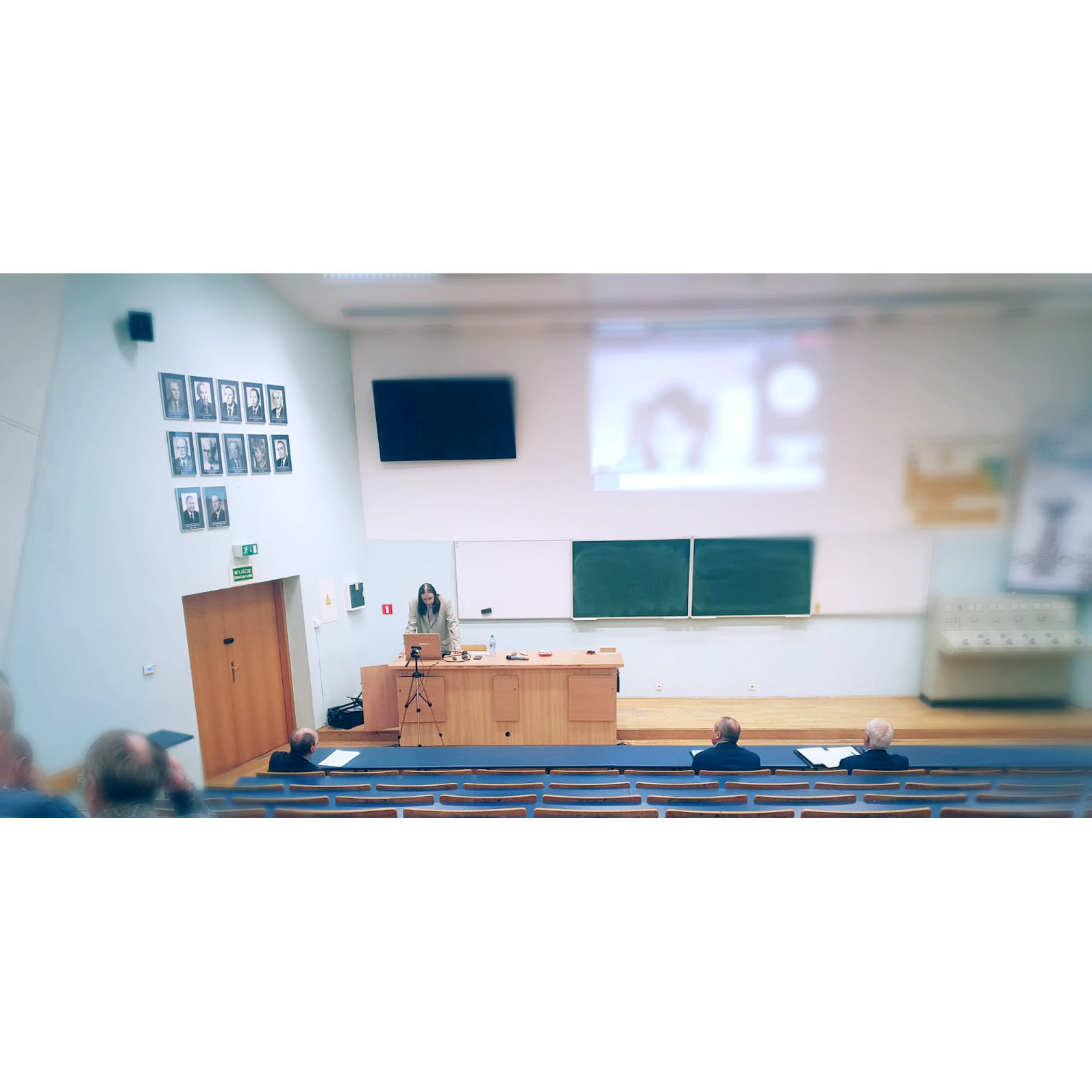
Conference
Dr. Tomasz Kosmala Represents Our Team at OPERANDO SPM 2023
We are proud to share that last week, Dr. Tomasz Kosmala represented our team at the 1st International Conference on Nanoscale Catalysis and Energy Conversion, OPERANDO SPM 2023, held at the Fritz Haber Institute in Berlin on November 15th and 16th, 2023.
Dr. Kosmala delivered a compelling presentation titled „Uncovering Active Sites and Enhancing Catalytic Activity in 2D Materials for Hydrogen Evolution Reaction.” His presentation focused on the latest advancements in identifying active sites and boosting the catalytic performance of 2D materials, which are crucial for hydrogen evolution reactions. This cutting-edge research holds significant promise for future developments in energy conversion and sustainable energy solutions.
The conference brought together leading experts and researchers in the field, providing a valuable platform for exchanging ideas and fostering collaborations. Dr. Kosmala’s participation highlights our ongoing commitment to advancing research in nanoscale catalysis and energy conversion.
We extend our congratulations to Dr. Kosmala on his successful presentation and look forward to further contributions and breakthroughs from his research.
18/11/2023
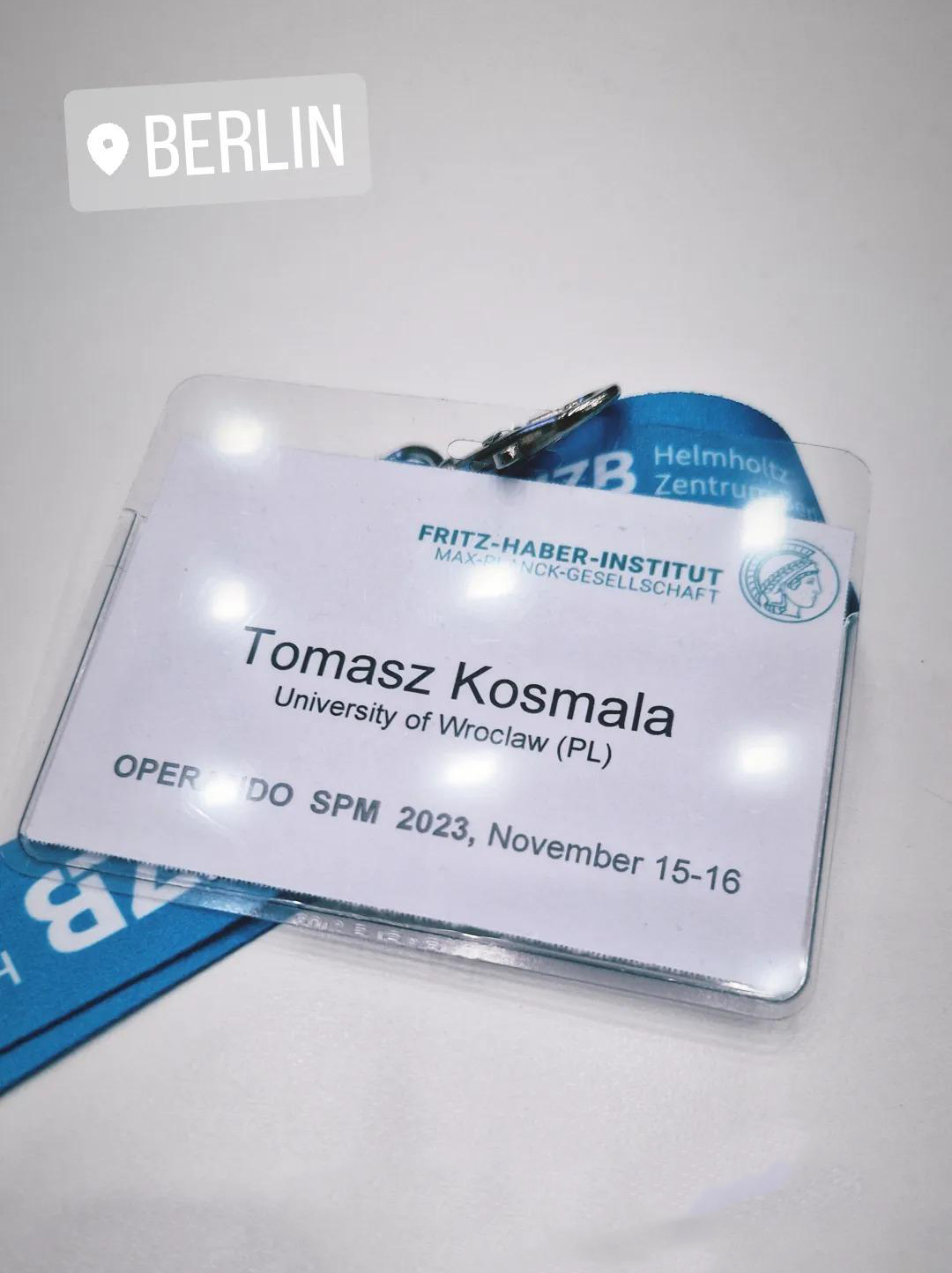
People
Welcome to Our New Master’s Student, Paulina Wira
We are delighted to announce that Paulina Wira has joined our research team as a Master’s student in Experimental Physics at the University of Wrocław, under the supervision of Dr. Tomasz Kosmala. Paulina began her Master studies in 2022, and her thesis work is set to make significant contributions to our understanding of catalytic processes.
Her research focuses on 2D molecular networks as single atom catalyst models for the oxygen reduction reaction, employing Electrochemical Scanning Tunneling Microscopy (EC-STM) techniques. This innovative project is crucial for advancing our knowledge in energy conversion technologies and enhancing the efficiency of catalytic systems.
We are excited to see the contributions Paulina will make to our research efforts and are confident that her work will lead to valuable insights and developments in the field of experimental physics.
Welcome aboard, Paulina! We look forward to your success and discoveries in our team.
15/10/2023
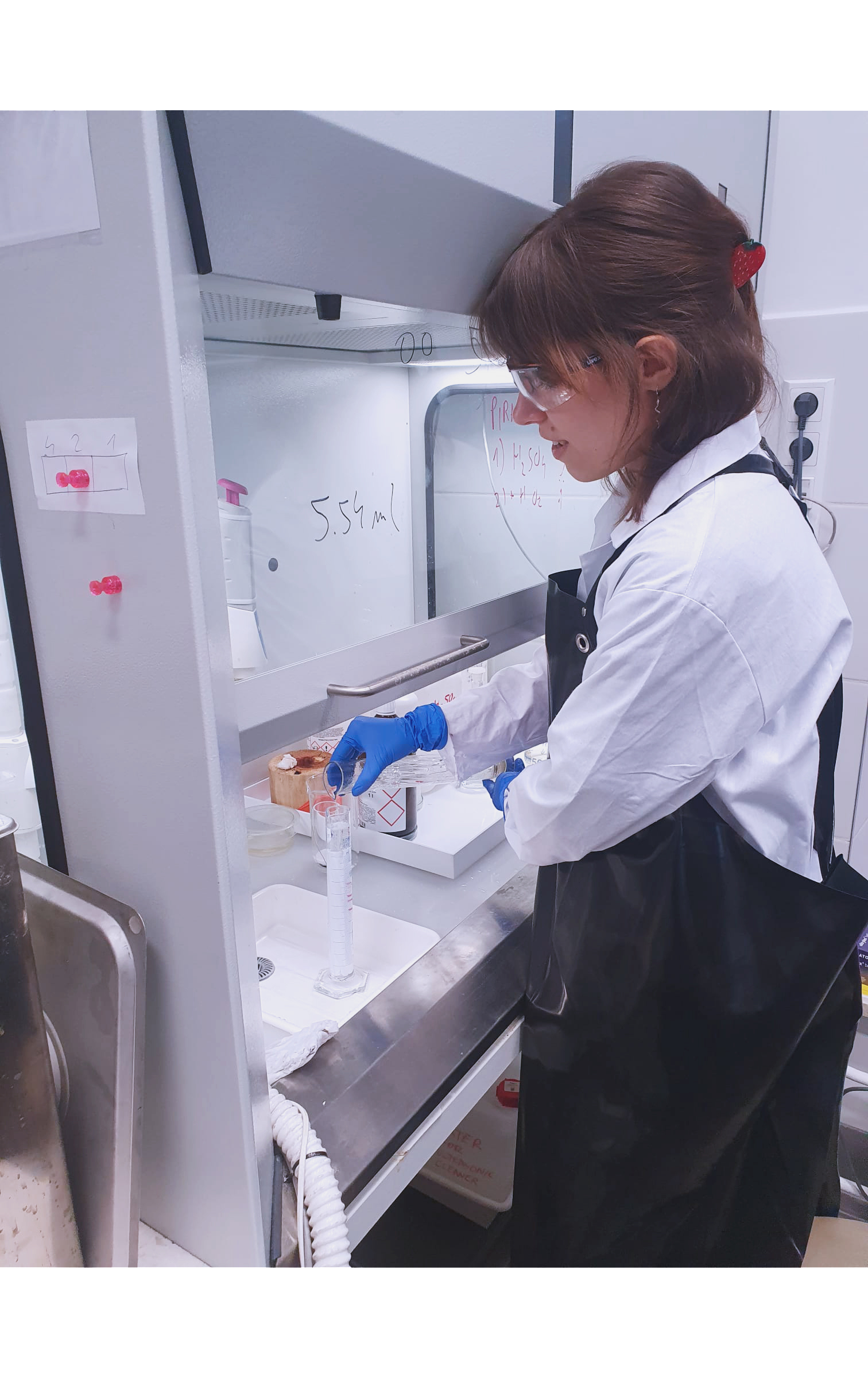
Award
Dr. Tomasz Kosmala Receives Prestigious Prof. W. H. Nernst Scientific Award
In a significant recognition of scientific prowess, Dr. Tomasz Kosmala was awarded the Prof. W. H. Nernst Scientific Award for Scientific Achievement last week at the Distributed Energy Congress in Kraków. The award celebrates notable contributions to the field of electrochemistry and was presented for Dr. Kosmala’s innovative research in developing a novel method for recording the electroactivity of individual atoms in operando.
This pioneering approach, developed in collaboration with colleagues from Interfaces & Nanomaterials for Catalysis Group from University of Padova, marks a breakthrough in hydrogen electrocatalyst development, potentially revolutionizing energy solutions.
The 5th edition of the competition, led by an expert panel under Prof. Konrad Świerczek from AGH’s Faculty of Energy and Fuels, also recognized achievements in other categories. Katarzyna Siuzdak won for Technical Achievement and Olaf Dybiński for Practical Achievement, underlining the diverse innovations shaping the future of electrochemical processes.
30/09/2023
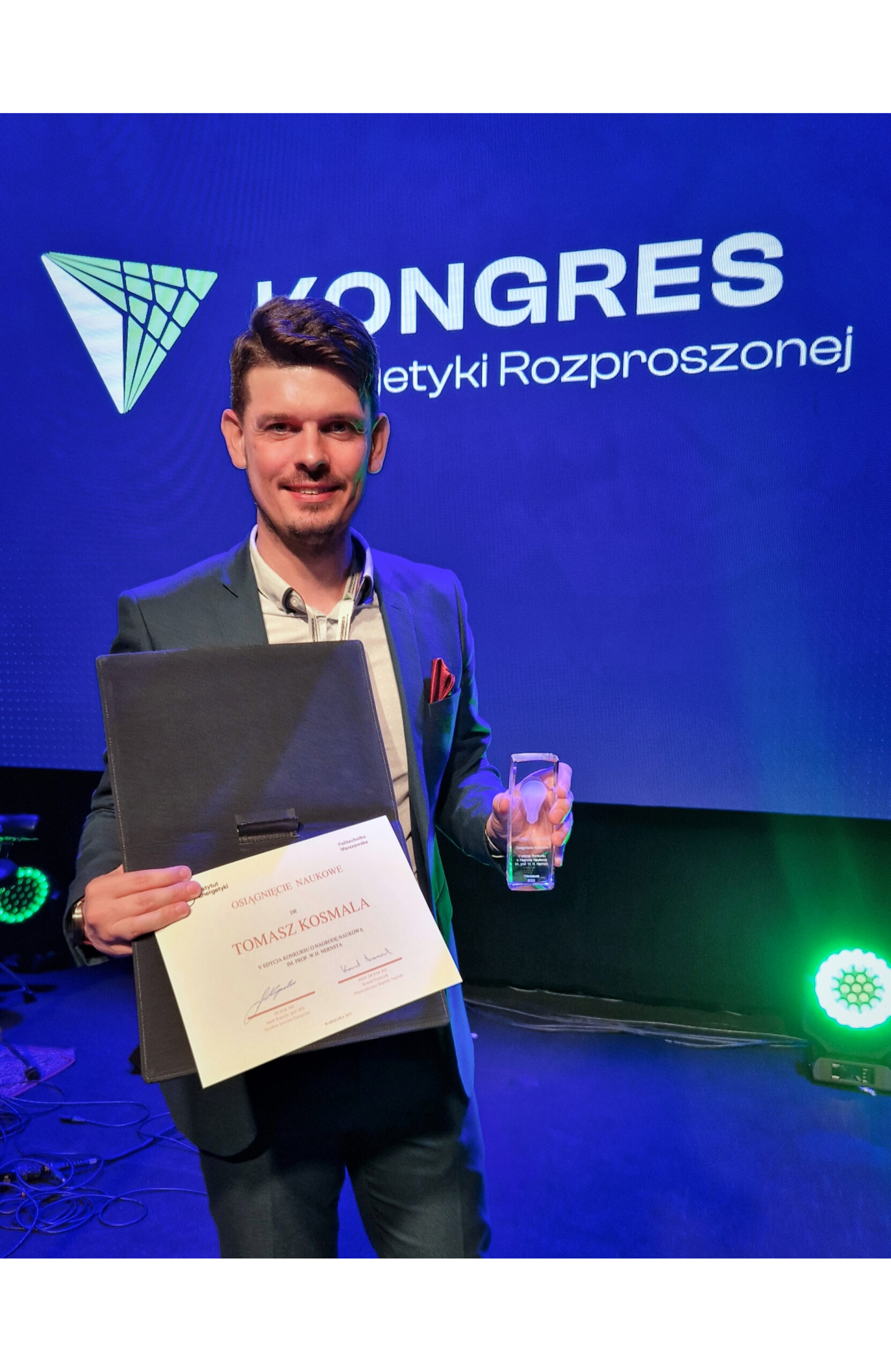
Conference
Dr. Tomasz Kosmala Highlights Innovation at CMD30 FisMat 2023 Conference in Milan
Last week, Dr. Tomasz Kosmala represented our team at the CMD30 FisMat 2023 conference, held in Milan from September 3rd to 8th. As an invited speaker, Dr. Kosmala presented his latest research, sharing innovative results with an international audience of experts in the field.
The conference provided an excellent platform for Dr. Kosmala not only to showcase his work but also to engage with fellow researchers. His participation facilitated the formation of new professional relationships, laying the groundwork for future collaborative projects that promise to push the boundaries of scientific discovery.
Stay connected with our website for more updates on these exciting developments and other news from our team’s ongoing research initiatives.
15/09/2023
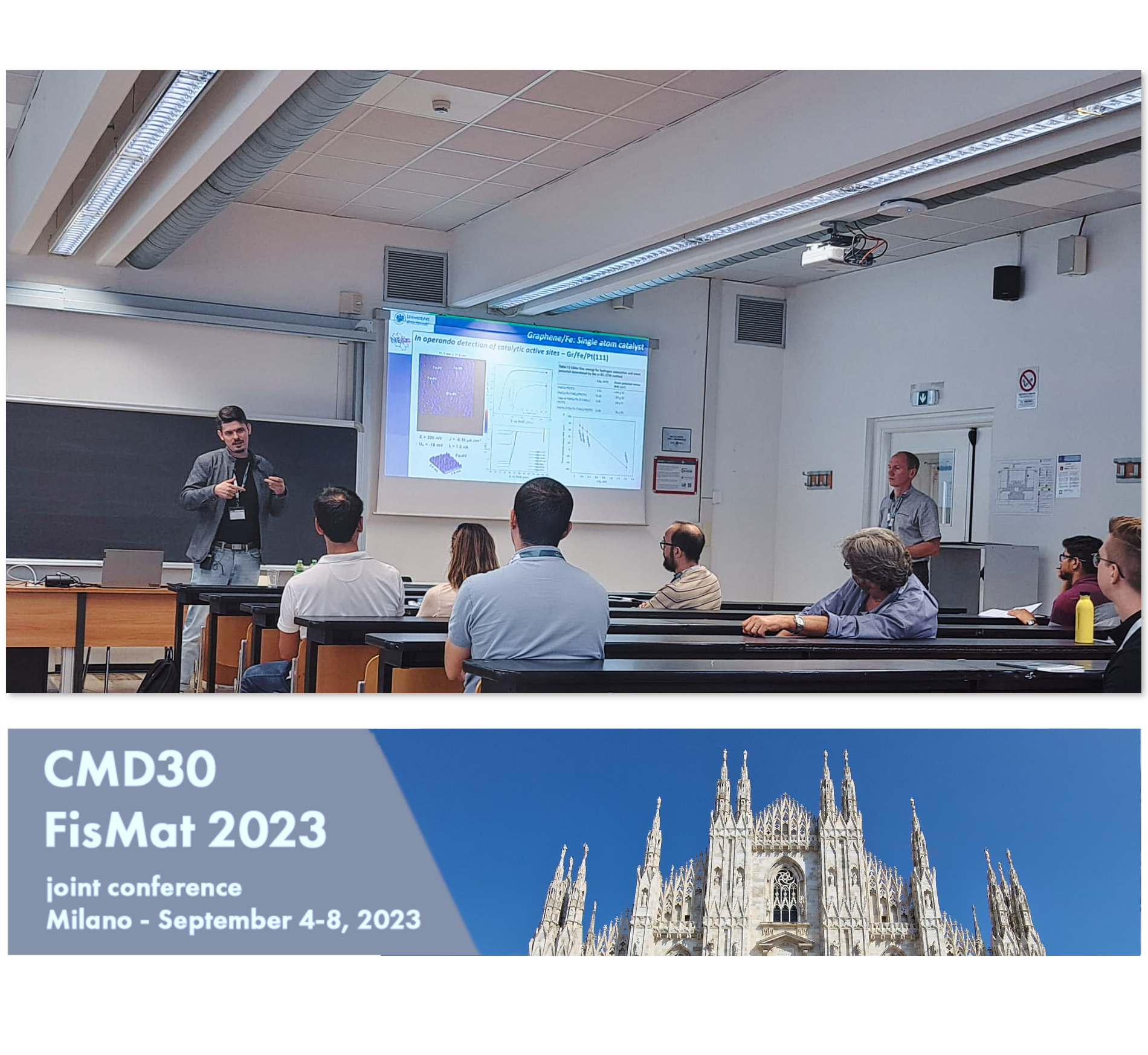
Research Stay
Exciting Research Collaboration Update
We are thrilled to announce the progress made during Dr. Tomasz Kosmala’s research stay at the Department of Chemical Science, University of Padua, in collaboration with the INCAT Group.
Dr. Kosmala’s work focused on investigating the correlation between catalyst activity and atomic-level structure. By synthesizing and characterizing novel materials, he aimed to develop cutting-edge electrocatalysts for green hydrogen production. His meticulous process involved cleaning the metal single crystal surface, growing graphene (Gr) on it, and creating a hexagonal network with embedded metal atoms, forming single-atom catalysts (SACs).
These SACs have the potential to revolutionize energy conversion processes. Through in operando investigations using electrochemical scanning tunneling microscopy (EC-STM), the team aims to gain real-time insights into their catalytic activity and stability.
This collaboration with the INCAT Group and the University of Padua has enriched our research capabilities and fostered international scientific exchange. We are grateful for the support from the University of Wrocław, financed by IDUB within the second edition of the competition for supporting academic teachers’ trips, and the National Science Centre Poland (NCN) for making this research possible.
26/07/2023
Award
Dr. Tomasz Kosmala Awarded Prestigious Scholarship for Outstanding Young Scientists
We are pleased to announce that Dr. Tomasz Kosmala has been honored with a prestigious scholarship for outstanding young scientists by the Minister of Education and Science of Poland. This accolade highlights Dr. Kosmala’s exceptional contributions to the field of physical science and his dedication to advancing research.
The scholarship acknowledges the exceptional talent and innovative research of young scholars across Poland. This year, the Minister of Education and Science awarded scholarships to 230 outstanding individuals, including 37 doctoral students across 51 disciplines, with Dr. Kosmala being one of the distinguished recipients.
Recipients of this esteemed scholarship will receive a monthly stipend of 5,390 złoty over three years, with a total of nearly 45 million złoty dedicated to nurturing promising young talent. The selection process was highly competitive, with 1,828 applications reviewed by an Advisory Committee using a rigorous point-based evaluation system.
Dr. Kosmala’s recognition is particularly significant given the competitive nature of this year’s scholarships, which attracted a record number of applications from across scientific and artistic fields.
Congratulations to Dr. Tomasz Kosmala on this well-deserved honor. We look forward to his continued contributions to science and innovation.
4/07/2023
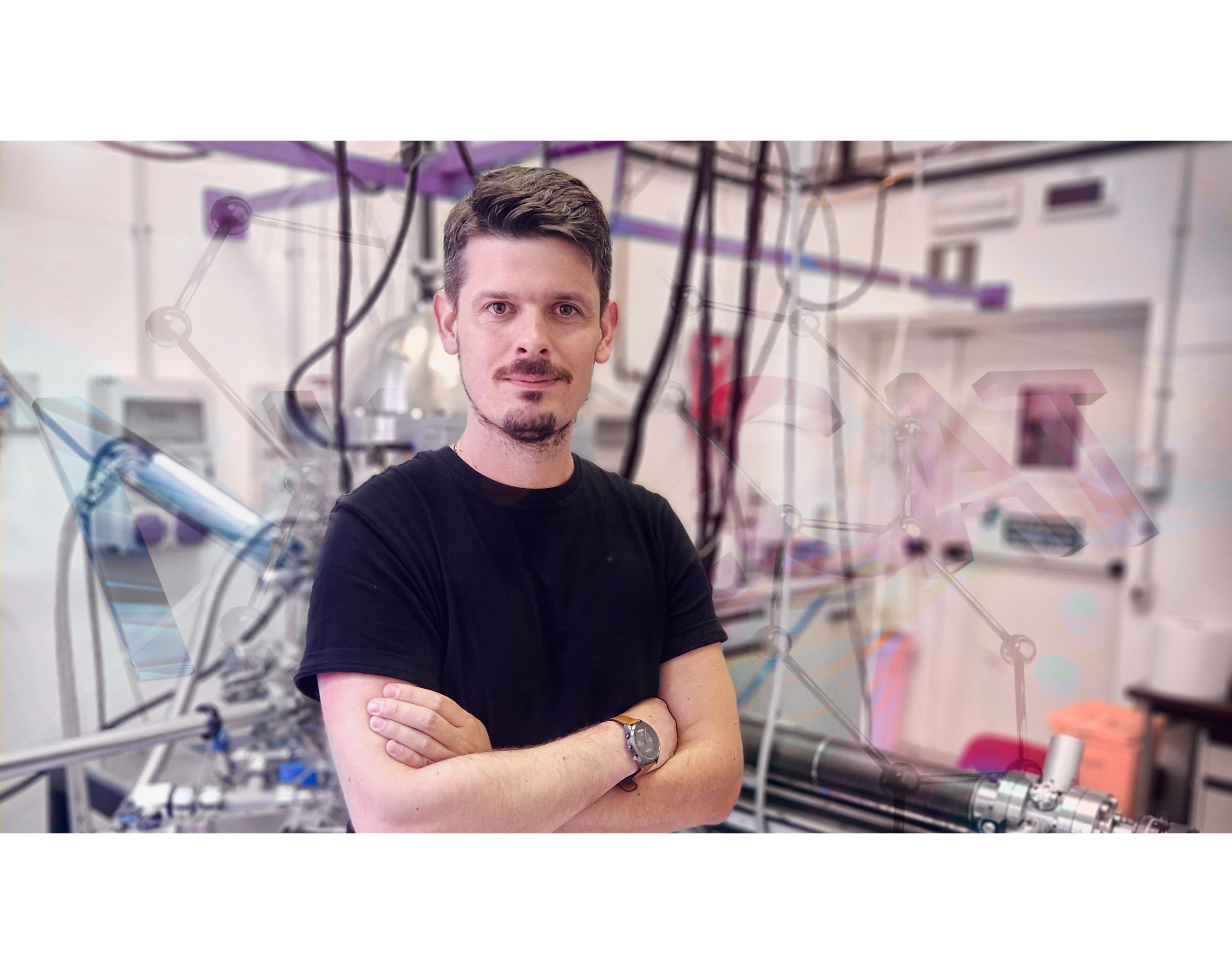
Research Stay
Successful Research Visit by PhD Student Jijin Yang
We are pleased to announce that we recently hosted PhD student Jijin Yang from the INCAT Group for a short research visit in our lab at the Institute of Experimental Physics, University of Wrocław. From February 25th to March 10th, Jijin conducted advanced Electrochemical Scanning Tunneling Microscopy (EC-STM) measurements, contributing valuable insights to our ongoing research projects.
Collaborations like this are essential for the exchange of ideas and expertise, enabling us to learn from one another and push the boundaries of scientific discovery. We are committed to supporting our students and visiting scholars in their pursuit of knowledge and providing opportunities to expand their scientific horizons.
We hope that Jijin enjoyed her time with us and found the experience both enriching and productive. We look forward to continuing our collaboration with the INCAT Group and welcoming more scholars in the future.
18/03/2023
Publication
New Publication Featured on ACS Energy Letters Supplementary Cover
We are thrilled to announce our latest publication, „Catalytic Activity of Defect-Engineered Transition Metal Dichalcogenides Mapped with Atomic-Scale Precision by Electrochemical Scanning Tunneling Microscopy,” a collaborative effort with the Interfaces & Nanomaterials for Catalysis Group from University of Padova. This significant study has earned a spot on the supplementary cover of the February issue of ACS Energy Letters, featuring a graphic designed by Tomasz Kosmala.
Our research provides a detailed atomic-scale mapping of the catalytic activity of MoSe2 in the hydrogen evolution reaction. By uncovering the intricate structure-activity relationships, this work opens new avenues for the development of more efficient catalysts tailored through defect engineering.
The full paper is available as open access—do not miss the opportunity to delve into this groundbreaking research and explore how these insights could revolutionize the field of catalysis.
Read the full article: [Link to the article]
14/02/2023
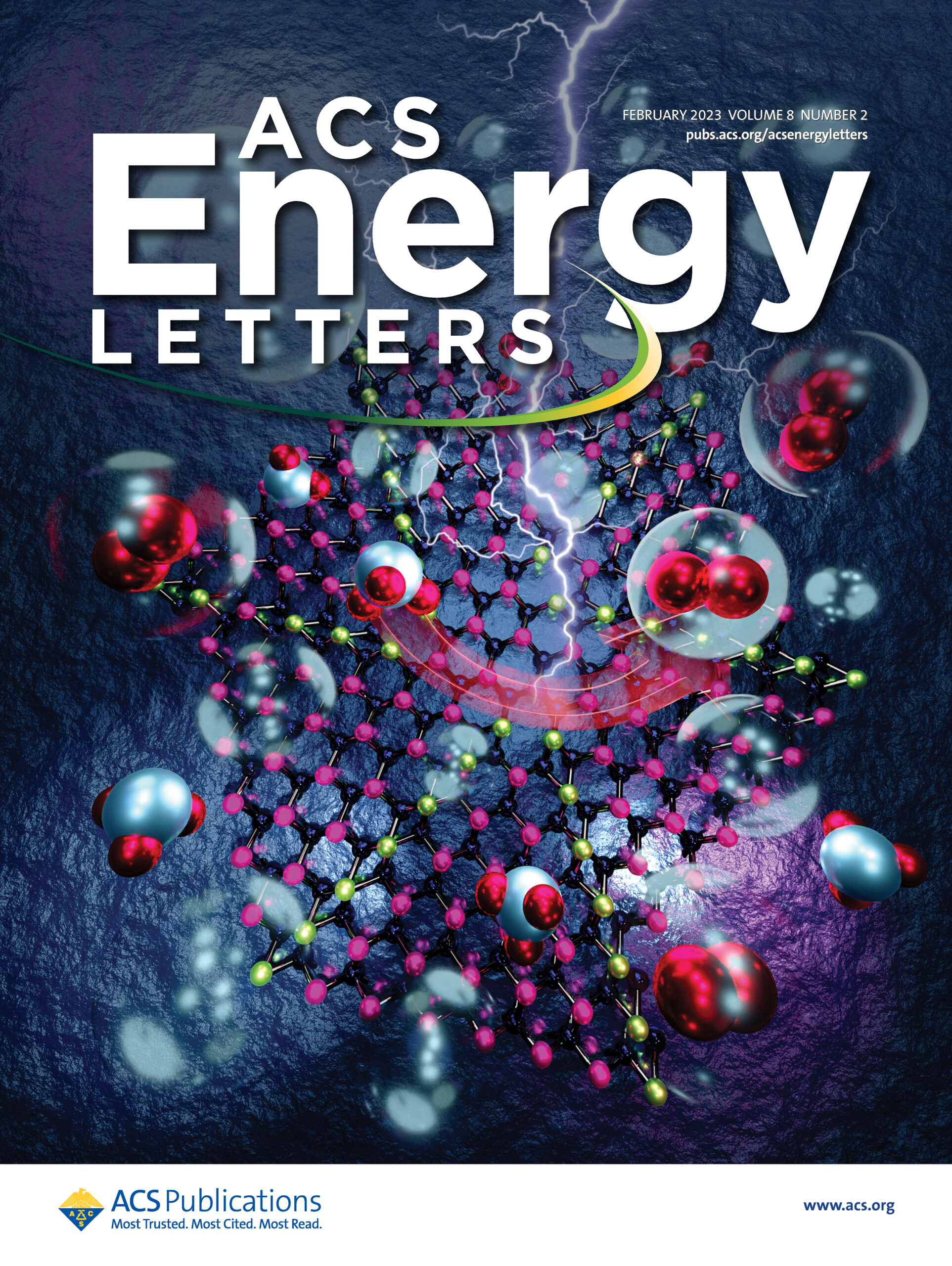
Award
Dr. Wasilewski Honored with the National Education Commission Medal
We are proud to announce that Dr. Wasilewski has been awarded the prestigious National Education Commission Medal for his exceptional contributions to education and upbringing. This honor recognizes Dr. Wasilewski’s dedication and impactful work in shaping the minds of future generations through his commitment to excellence in education.
The medal is a testament to his innovative teaching methods, his mentorship of young scholars, and his ongoing efforts to enhance educational standards within our community. Dr. Wasilewski’s achievements not only reflect his personal dedication but also highlight the critical role educators play in our society.
Please join us in congratulating Dr. Wasilewski on this well-deserved recognition. We look forward to his continued contributions to our educational community and the inspiring influence he will undoubtedly maintain in the years to come.
18/12/2022
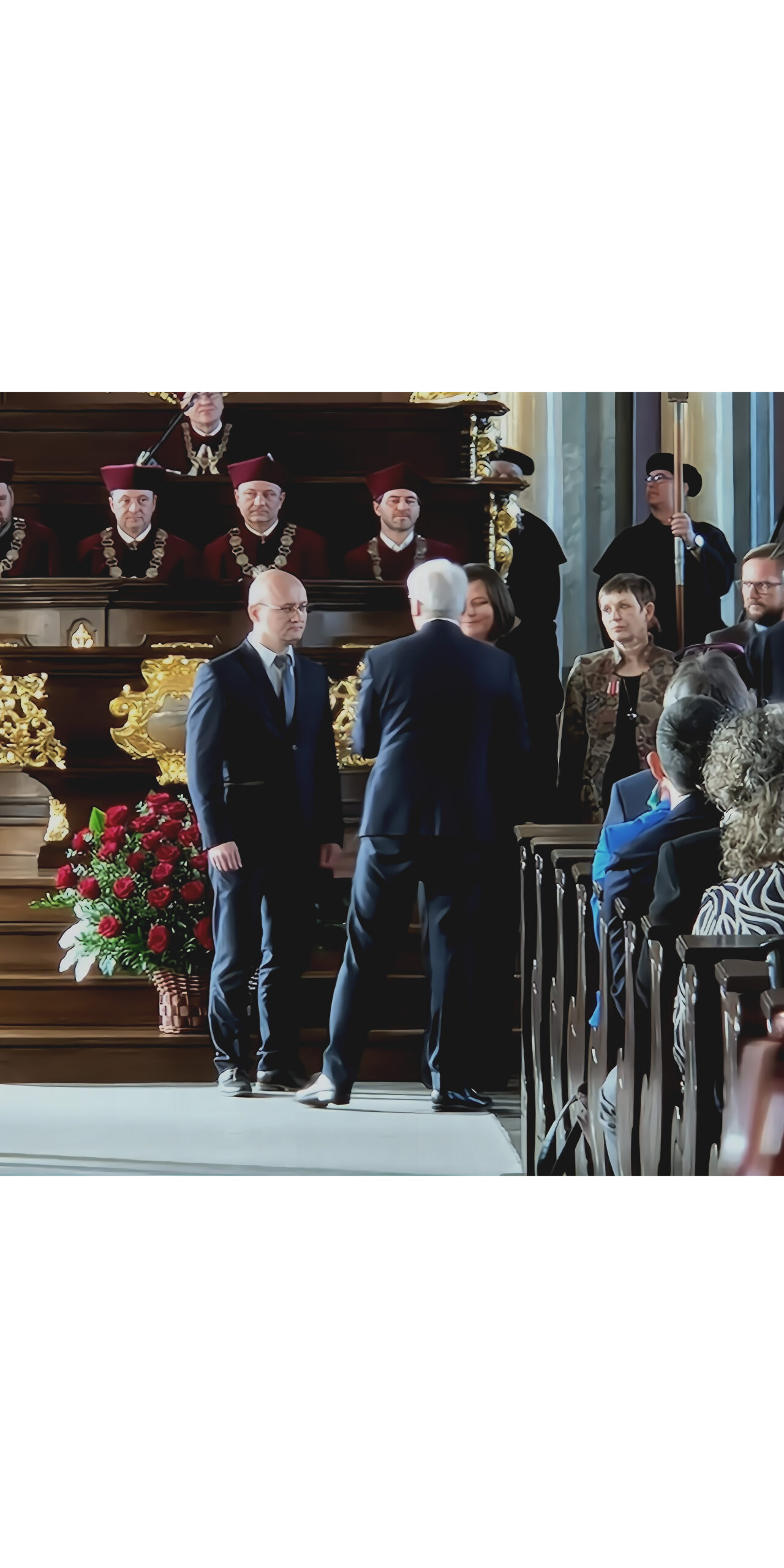
Conference
Successful Presentation at the XI Workshop on Applications of Scanning Probe Microscopy – STM/AFM 2022
We are delighted to announce that our research team recently participated in the XI Workshop on Applications of Scanning Probe Microscopy – STM/AFM 2022, held in Zakopane, Poland. The team presented a poster titled „2D Molecular Network as Single Atom Catalyst Model Explored with EC-STM toward Oxygen Reduction Reaction” and delivered a presentation on „Storage of Atomic Hydrogen in the 2D Confined Space: In Operando Visualization of the Protons Intercalation Under the Graphene Layer.”
Both contributions were met with enthusiastic reception and sparked fruitful discussions among experts in the field, underscoring the relevance and impact of our work. We extend our gratitude to the National Science Centre (NCN) for funding our research through the MINIATURA-5 and SONATA-17 programs, enabling us to advance our studies and share our findings with the scientific community.
Thank you to all participants and organizers of the conference for a stimulating exchange of ideas and for providing an excellent platform for presenting cutting-edge research.
18/12/2022
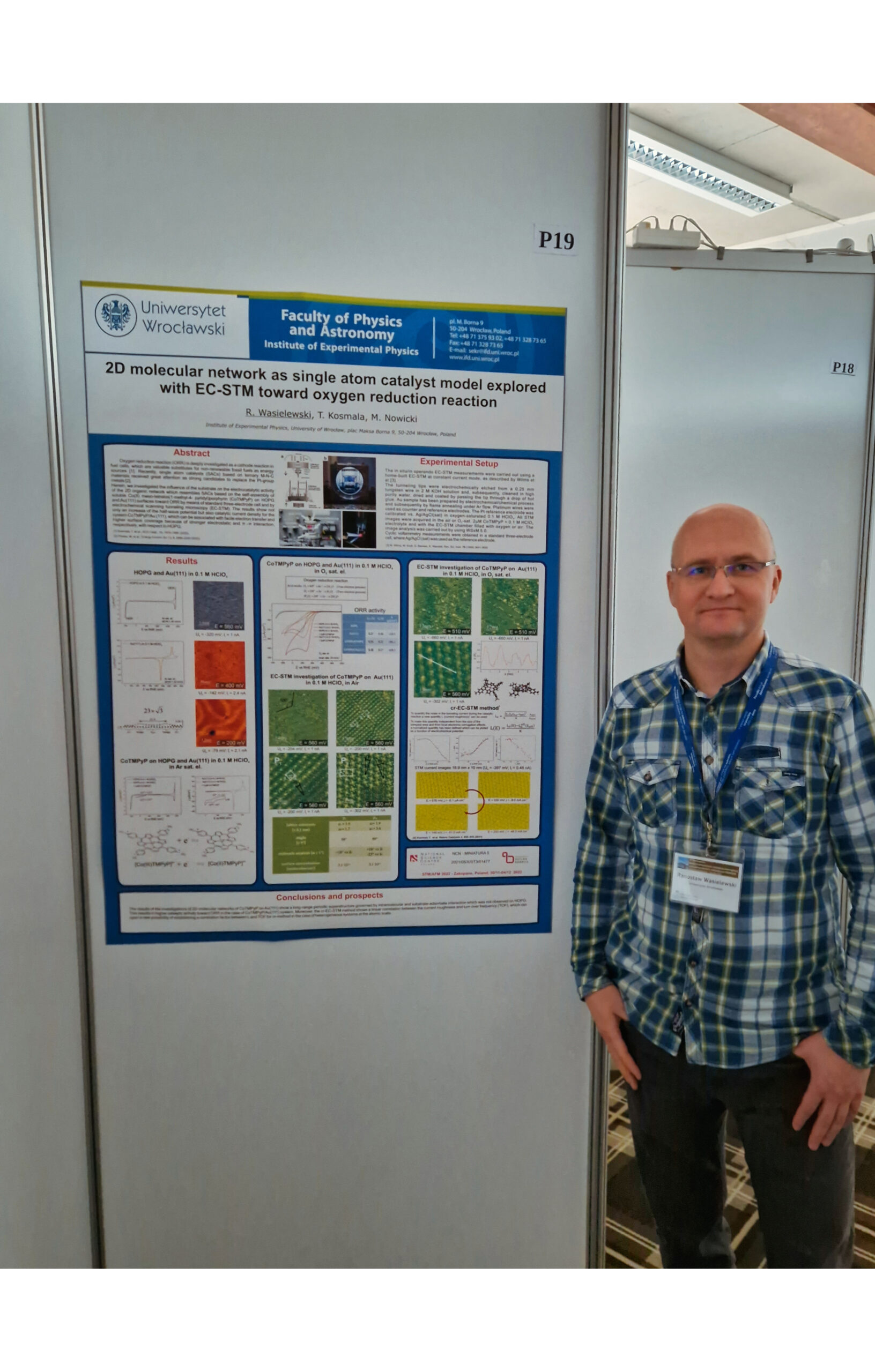
Project
Launch of New Research Project: “Atomic-scale Investigation under In Operando Conditions of 2D Materials for Energy Storage and Conversion”
We are excited to announce the official kickoff of a new research initiative led by Tomasz Kosmala. The project, titled “Atomic-scale Investigation under In Operando Conditions of 2D Materials for Energy Storage and Conversion,” has been generously funded by the National Science Centre (NCN) under the SONATA-17 call.
This ambitious project aims to delve into the atomic-scale mechanisms of 2D materials, which are crucial for advancing energy storage and conversion technologies. By understanding these materials under operational conditions, the research seeks to uncover insights that could lead to more efficient and sustainable energy solutions.
Stay connected with us for ongoing updates on this project. We look forward to sharing discoveries and breakthroughs as our team progresses in this cutting-edge field of research.
Follow our journey and stay tuned for more exciting news from the lab!
1/09/2022

